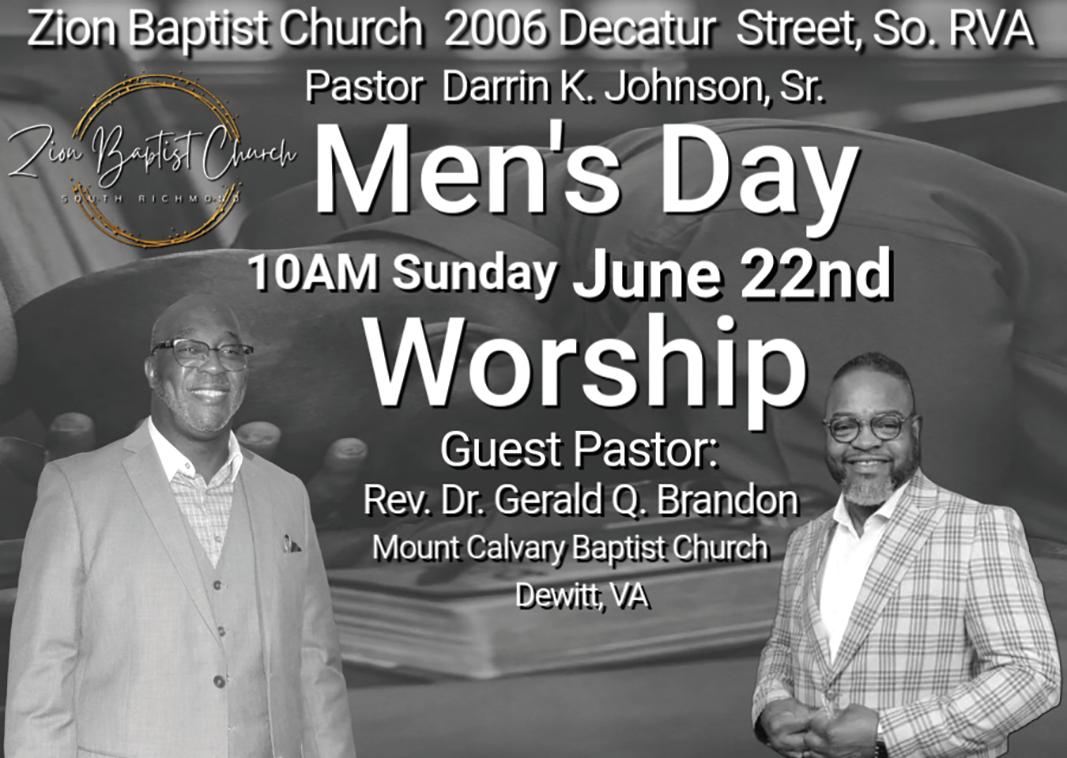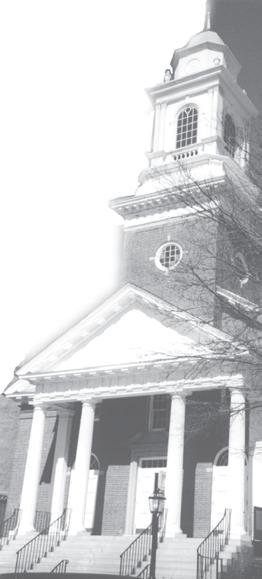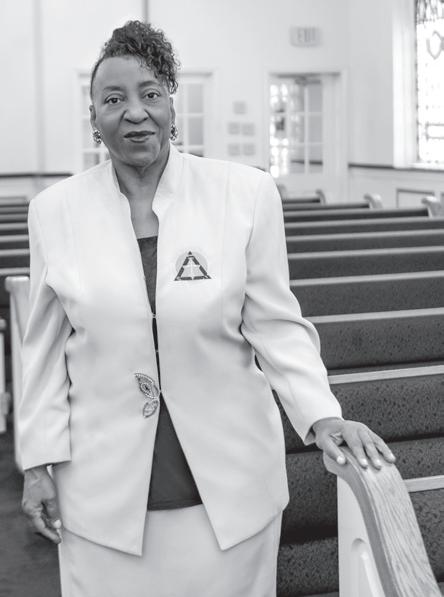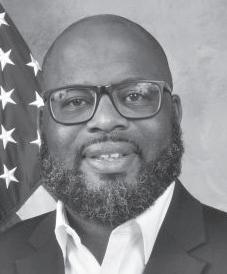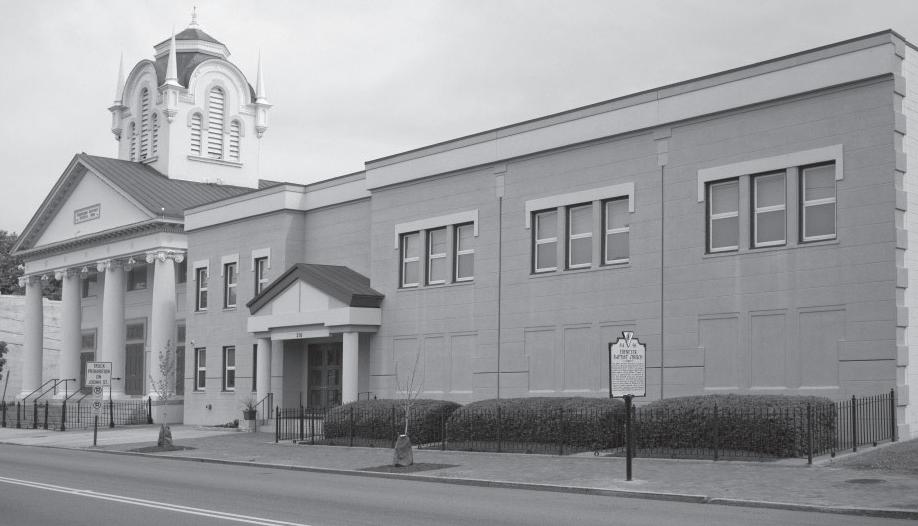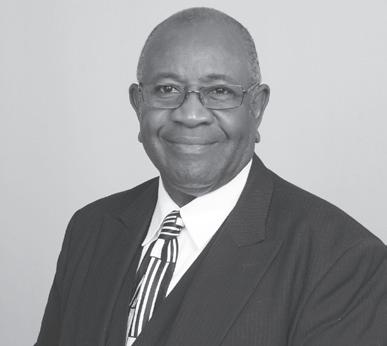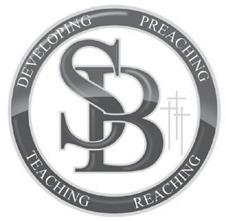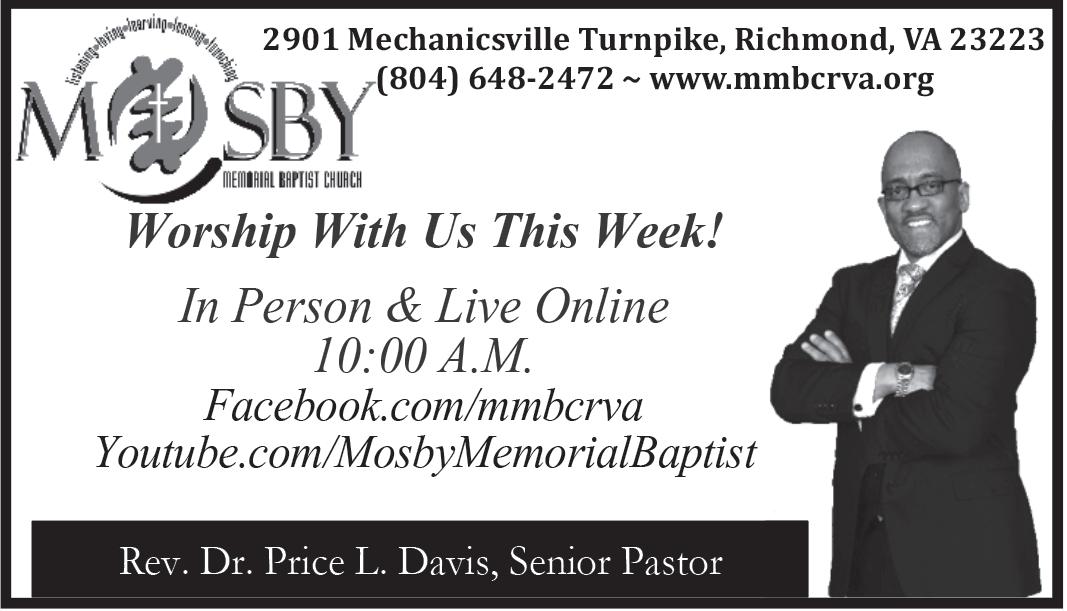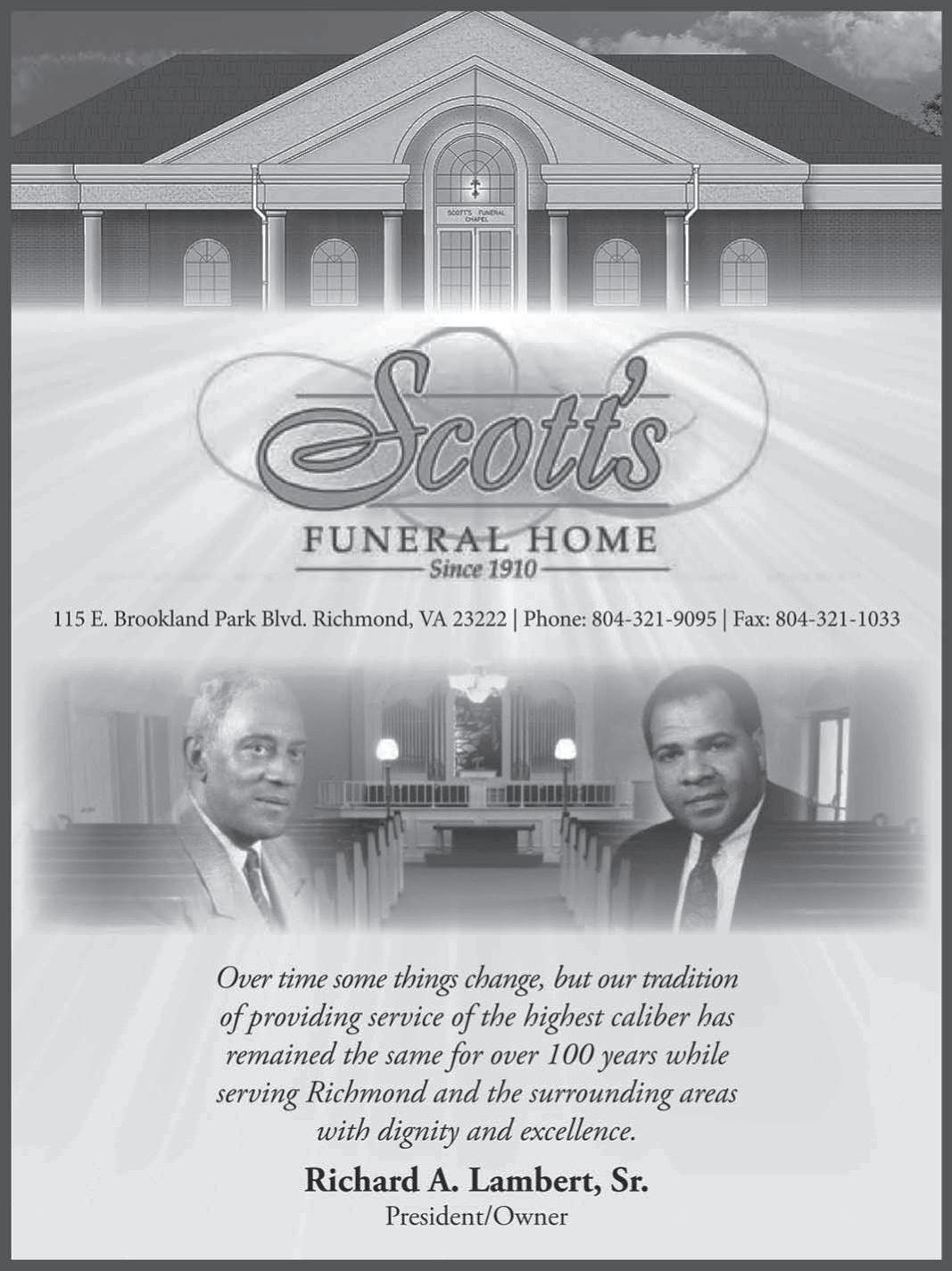




By Graham Moomaw
A Richmond-area politician appeared to win the lieutenant governor spot on Virginia’s statewide Democratic ticket in Tuesday’s elections. But it wasn’t former Mayor Levar Stoney.
State Sen. Ghazala Hashmi, D-Chesterfield, declared victory Tuesday night after an unpredictable six-way primary to earn the right to run alongside gubernatorial candidate Abigail Spanberger in the fall.
“Tonight we’ve made history yet again, not just by winning this primary, but by declaring with one voice that Virginia is not going to be bullied or broken or dragged backwards by the chaos that’s unfolding in Washington,” Hashmi told her supporters at an election night party in Richmond’s Fan District.
Though Hashmi came out on top according to unofficial results, an exceptionally tight finish showed Stoney within the 1% margin that allows for election recounts under Virginia law. State Sen. Aaron Rouse, D-Virginia Beach, wasn’t far behind.
However, Stoney conceded the race Wednesday morning, congratulating Hashmi and pledging his support in November in a statement.
Spanberger and Democratic Party of Virginia Chairman Lamont Bagby also issued statements congratulating Hashmi on her victory, signaling that — as far as party leaders were concerned — the race was settled Tuesday night.
“As a proven leader in the Virginia Senate, Sen. Hashmi has passed legislation that’s delivered economic investment, improved schools, protected health care and defended reproductive freedom,” Spanberger said.
Representing the Richmond suburbs in the General Assembly since 2020, Hashmi is the first Muslim to serve in the Virginia Senate. In 2019, she ousted Republican Sen. Glen Sturtevant from a key Richmond-area district, a win that helped flip the state Senate to Democratic control.
Though Hashmi, Stoney and Rouse ran virtually neck-andneck statewide, Stoney ran far behind Hashmi in Richmond, the city he led for eight years as mayor.
Hashmi’s sizable margin of victory in Richmond — where many voters said in interviews they were opposing Stoney because of the water problems that came to light just after he left office — may have made the difference in the statewide result.
Please turn to A4
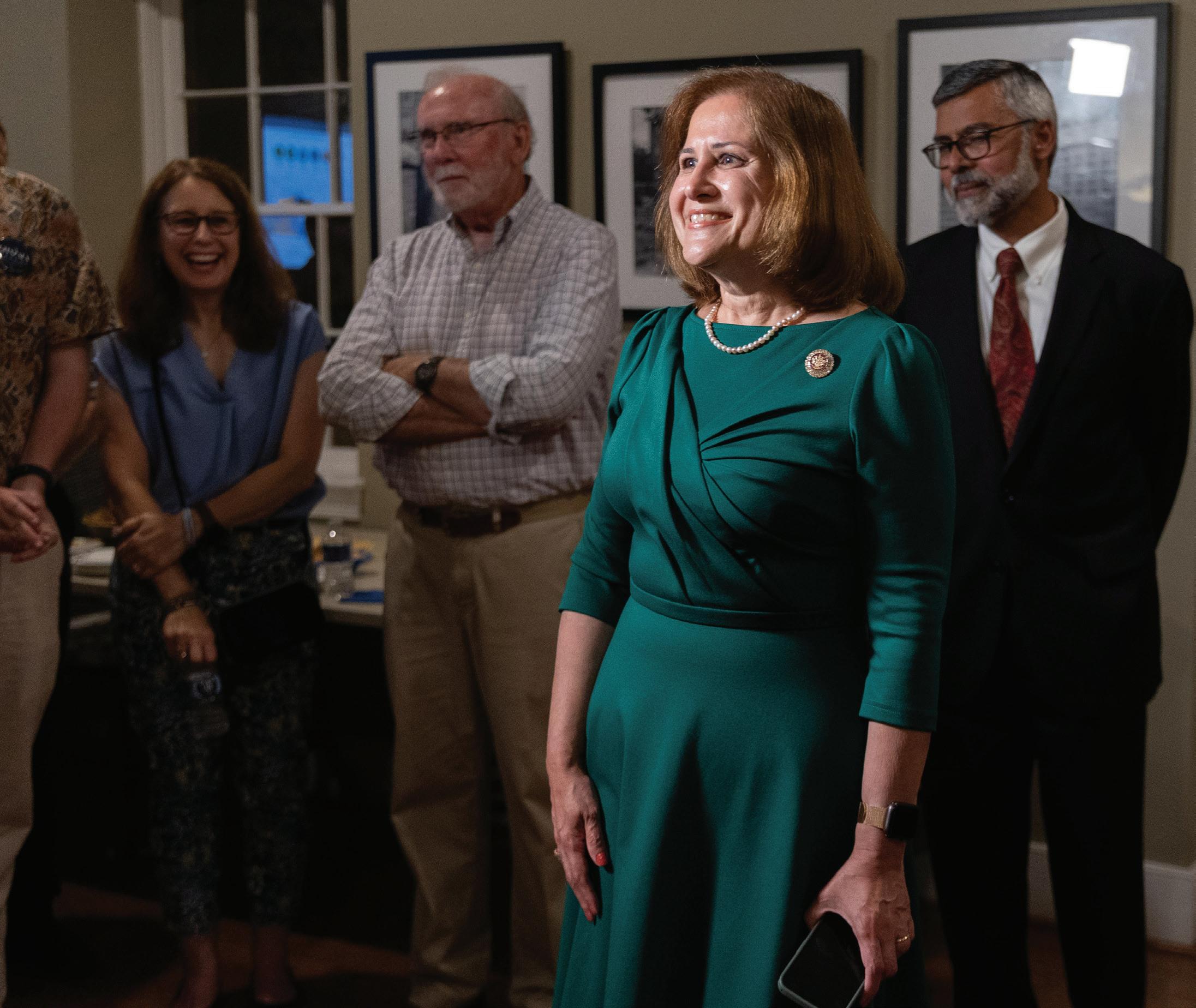

Thousands join nationwide ‘No Kings Day’ protest
By George Copeland Jr.
Downtown Richmond rang with chants and cheers Saturday as thousands gathered for the city’s No Kings Day of Defiance, part of a nationwide protest against the Trump administration. The diverse crowd filled Capitol Square, gathered in Kanawha Plaza and marched through downtown, at times bringing traffic to a standstill as their chants and signs stretched across the evening.
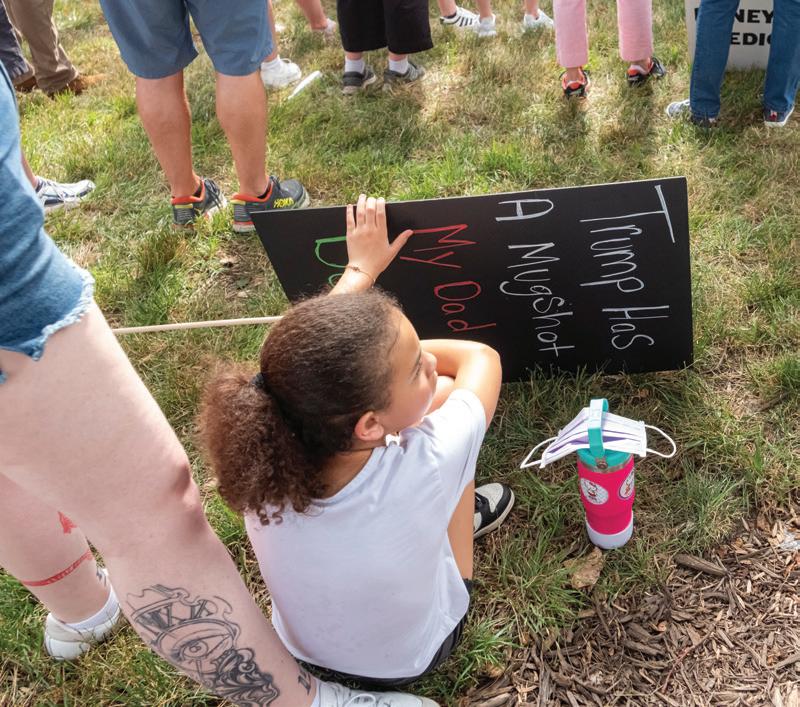
The event was the second “No Kings” protest in Richmond organized this year by grassroots Virginia groups, after a previous rally on President’s Day, as part of a nationwide campaign against President Donald Trump’s administration and its actions.
“Communities across this country are saying loud and clear, we will not stay silent when our freedoms are under attack,” ACLU-VA Executive Director Mary Bauer said during a speech.
“We will not sit idly by when our neighbors are under attack, we will not sit on our hands while they try to undermine our civil rights and civil liberties and do away with the rule of law.”
Despite forecasts of heavy rain, rumors of counterprotests and a warning from Gov. Glenn Youngkin that the National Guard would respond to any illegal activity, the protest occurred without incident.
A brief rain shower near the end did little to deter the crowd, which had marched to Kanawha Plaza and cheered as people waved flags and signs from atop the park fountain.
The No Kings protests brought together millions of people in over 2,100 localities
VDH issues third notice to Richmond after May boil water advisory
By George Copeland Jr.
State officials with the Virginia Department of Health (VDH) have raised concerns about Richmond’s water system for the third time this year, issuing another Notice of Alleged Violation to the city Monday over the May boil water advisory. The notice cites operational issues that officials believe contributed to the incident, which affected water service in several neighborhoods. It also lists alleged regulatory violations related to oversight, maintenance and water pressure at the Richmond water treatment plant.
VDH determined the violations partly through the explanation provided by Mayor
Danny Avula and Richmond Department of Public Utilities (DPU) Director Scott Morris for the advisory, which pointed to delayed maintenance of plant equipment and poor raw water quality. While the notice acknowledged the work done to improve Richmond’s water system
Edge of Daybreak shines again with new music, film
By Davy Jones
In 1979, a group of inmates at Powhatan Correctional Center recorded an album with the help of a mobile studio from Richmond’s Alpha Audio. Over five hours, the band Edge of Daybreak laid down eight soul and disco tracks within the prison walls. Their album, “Eyes of Love,” captured the hopes and emotions of men behind bars. “It lifted me up,” said co-lead vocalist Harry “Cupcake” Coleman. “It’s a prison. You can’t go nowhere. And that gave me my freedom.”
The album became a prized collectible and sparked local buzz, but band members were soon dispersed by transfers and parole. More than 40 years later, their music and story are reaching new audiences through a documentary, podcast and a newly released EP. Thanks to a vinyl reissue, a needle-drop in an Oscar-winning film, a podcast launched in February and a half-hour documentary, which premieres June 19 at 11 p.m. on A&E, Edge of Daybreak is on the rise. There’s even new music — a four-song EP released in January called “New Horizon.”
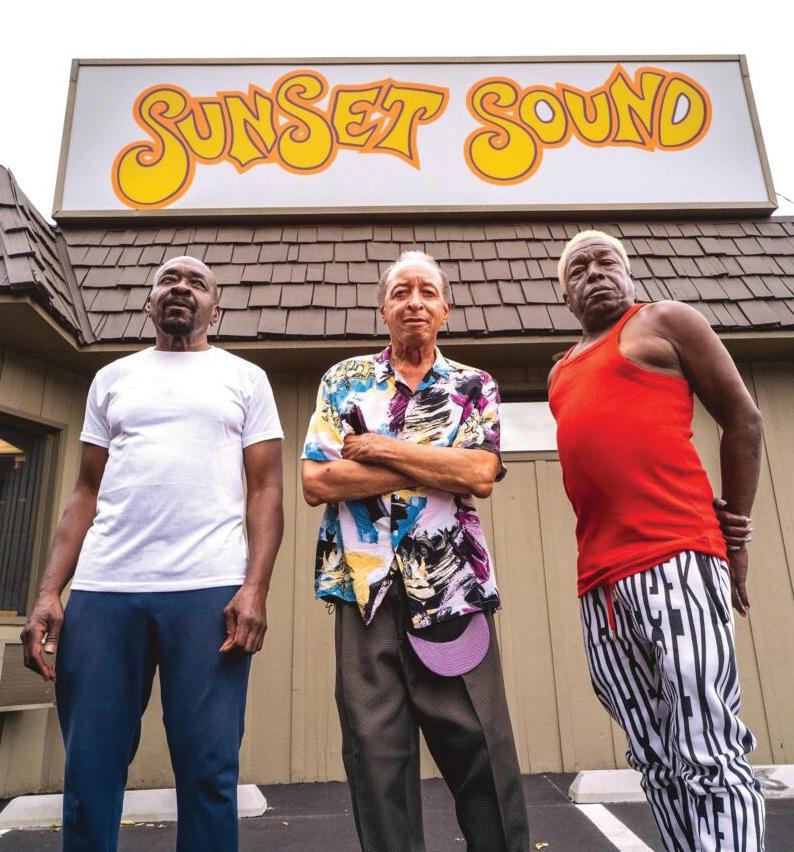
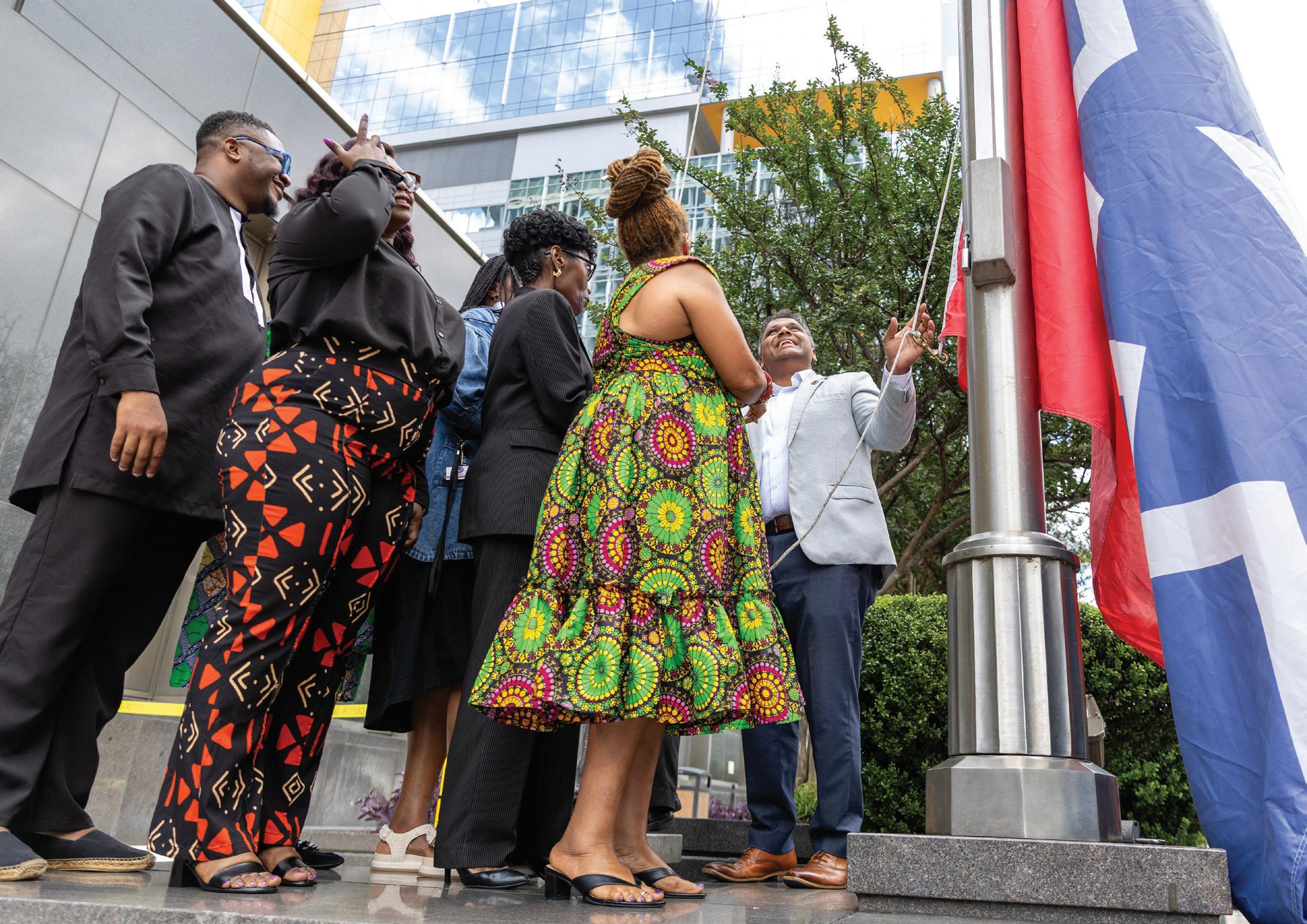
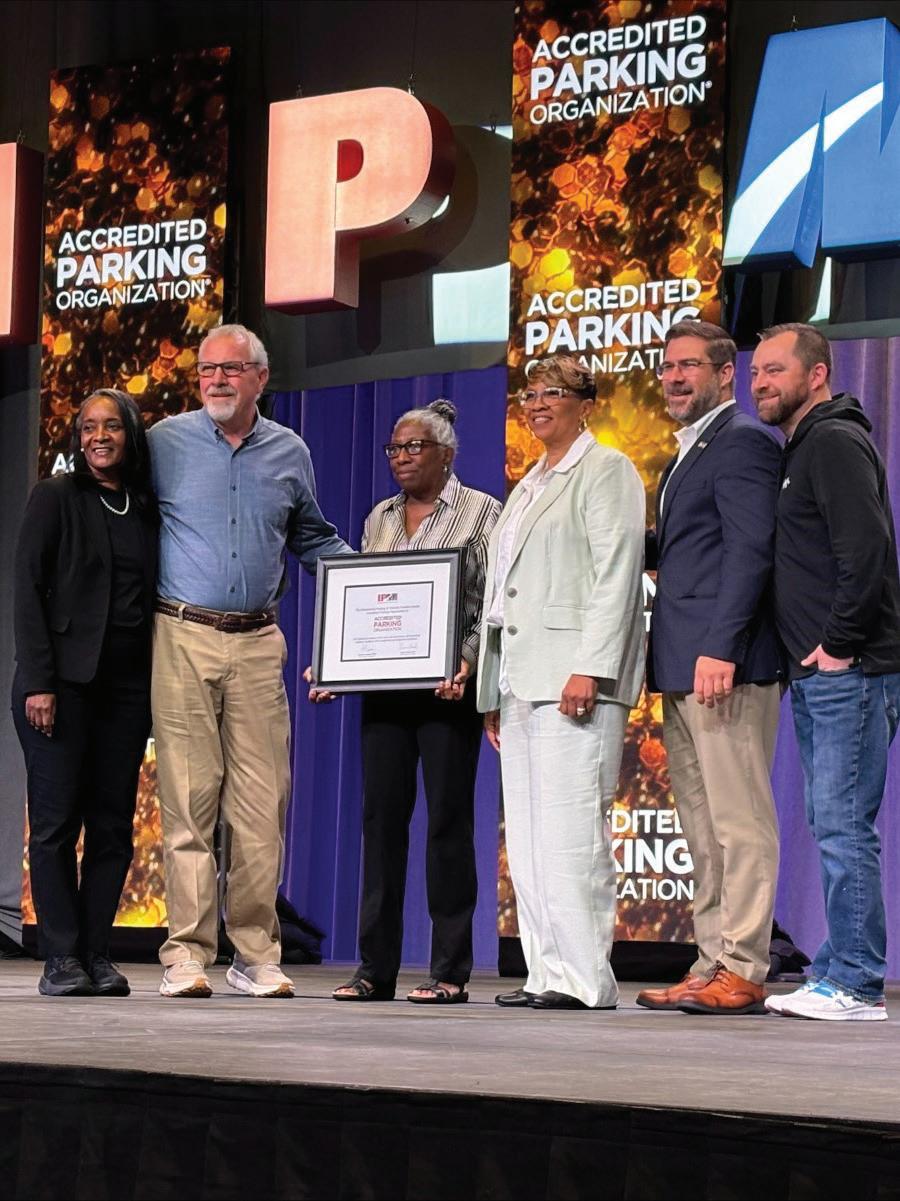
receive the Accredited Parking Organization with Distinction award at the annual International Parking & Mobility Institute meeting in Louisville, Ky.
For many Richmond residents, finding a parking spot can feel like navigating a maze of confusing signs, unpredictable enforcement, and hidden fees. Despite these challenges, the City of Richmond’s Parking Enterprise Division has recently achieved a notable milestone: earning the Accredited Parking Organization status.
This accreditation recognizes organizations that adhere to best practices in responsible parking management, customer service, professional development, sustainability, safety, data security, and risk management.
“This achievement is the top benchmark of success in our industry, and it follows a comprehensive documentation and review process,” said Shawn Conrad, CEO of the International Parking & Mobility Institute. “Only best-of-class organizations can meet the demanding level of excellence required to gain accreditation.”
To qualify for APO with Distinction, Richmond had to demonstrate achievement of more than 100 criteria across 14 categories, plus 25 required criteria, and meet more than 60 additional exceptional best practices.
“This designation is earned each day by the men and women of our Parking Enterprise Division,” said Gail Johnson, Richmond’s director of general services. “I am thrilled to see their hard work recognized.”
“Parking isn’t flashy, but it’s vital to our city,” said Lynne Lancaster, deputy director of the Parking Enterprise Division.
Norfolk Mayor Kenneth C. Alexander has been selected as the next vice chancellor for strategic partnerships for the Virginia Community College System, the network announced Monday.
His appointment by VCCS Chancellor David Doré takes effect July 10.
Alexander, who has served as Norfolk’s mayor since 2016 and is not seeking reelection, will lead public and private resource development, legislative engagement and systemwide communications. He will also serve as executive director of the Virginia Foundation for Community College Education.
“We are excited to welcome Dr. Alexander to our leadership team,” Doré said in a statement. “His visionary leadership
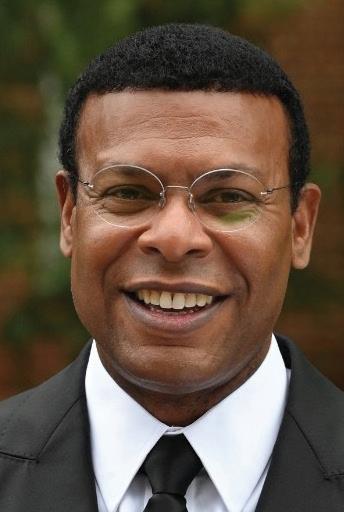
and deep commitment to innovation and opportunity will help drive strategic initiatives that change lives and elevate Virginia’s workforce.”
Alexander’s appointment follows a career spanning education, government and business.
He previously oversaw a national network of career colleges where enrollment grew by more than 15% and graduation rates reached 86%.
Alexander began his academic career teaching international relations at Tidewater Community College and later served in the Virginia General Assembly, where he
helped secure funding for major projects at Eastern Virginia Medical School. As mayor, he launched the Norfolk Open Data portal, established an innovation corridor and partnered with local universities to expand downtown entrepreneurship and research initiatives.
“Higher education is a pathway for economic growth and social mobility, and I am enthusiastic about using my experience to enhance partnerships that will benefit our students and industries across the commonwealth,” Alexander said in a statement.
Alexander holds an associate degree from Brightpoint Community College, a bachelor’s degree from Old Dominion University, a master’s degree from Norwich University and a doctorate from Antioch University.
Free Press staff report
Virginia State University has appointed Jessica Brooks as interim dean of the College of Natural and Health Sciences and Desmond Stephens as vice provost for academic affairs, effective July 1.
Brooks, a faculty member at VSU for nearly eight years, previously served as associate dean for the college and has held roles including associate director of clinical training for the doctoral program in clinical psychology. She also helped secure an undergraduate practicum to provide students with practical community experience.
A two-time VSU alumna, Brooks holds master’s and doctoral degrees from the university. She succeeds Derrick Scott, who will become provost at Fort Valley
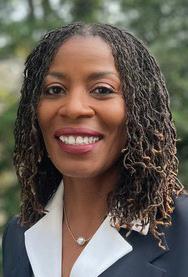
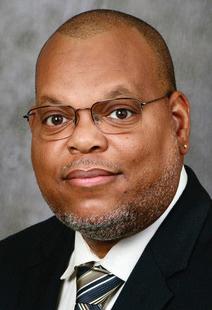
State University in Georgia.
Stephens brings nearly 30 years of teaching experience and more than a decade in higher education leadership. Most recently, he was associate dean for undergraduate activities at Florida A&M University’s College of Science and Technology. He has led efforts in academic
advising, curriculum reform and student success initiatives.
A nationally recognized advocate for educational equity, Stephens maintains an active research agenda as an associate professor of mathematics, securing more than $7 million in external funding during his career.
“We are thrilled to welcome Dr. Stephens to Trojan Nation,” said VSU Provost and Vice President for Academic Affairs Tia A. Minnis. “His extensive background in faculty advancement and student success, particularly within the context of HBCUs, aligns with our bold vision for academic excellence at Virginia State University.”
As vice provost, Stephens will provide strategic leadership to advance academic innovation, faculty development and student success initiatives at VSU.
Free Press staff report
As temperatures climb across the region, the City of Richmond is providing several options to help residents stay cool and safe through Labor Day.
Walk-up cooling centers, public libraries, outdoor pools and an emergency heat shelter are all available as part of the city’s response to high heat.
The Department of Social Services is operating two cooling centers, offering a brief escape from the heat along with bottled water. The centers are located at Marshall Plaza, 900 E. Marshall St., and
Southside Plaza, 4100 Hull Street Road.
Both are open Monday through Saturday from 10 a.m. to 6 p.m.
Residents can also visit any of the city’s public library branches, which offer airconditioned spaces. Hours vary by location. A full list of branch hours can be found at rvalibrary.org/about/hours.
The city’s Parks, Recreation and Community Facilities department also operates outdoor pools that are open to the public for cooling off. Pools are open Monday through Friday from noon to 8 p.m., and Saturday and Sunday from noon to 7 p.m.
The city’s public pools are located at
Battery Park, 2719 Dupont Circle; Blackwell, 238 E. 14th St.; Fairmont, 2000 U St.; Hotchkiss Field, 701 E. Brookland Park Blvd.; Powhatan, 1000 Apperson St.; Randolph, 1507 Grayland Ave.; and Woodville, 2305 Fairfield Ave. In the event of extreme heat—defined as a forecasted temperature of 92 degrees or higher for two or more consecutive hours—the Salvation Army will open a shelter at 1900 Chamberlayne Ave. The shelter operates from 11 a.m. to 5 p.m., with lunch served. It will remain open overnight if temperatures are expected to remain above 92 degrees at 9 p.m.
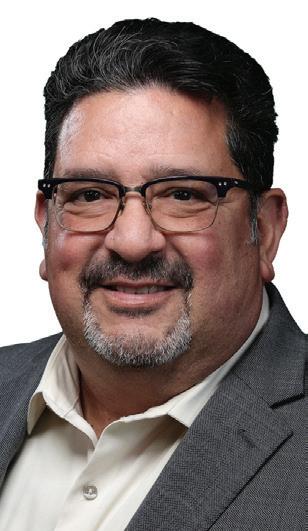
Free Press staff report
The City of Richmond has launched an online progress tracker to update the public on its overhaul of the city’s purchasing card, or p-card, program — a system that has faced repeated criticism for weak oversight and misuse.
The new tool, announced Monday, is part of efforts to restore trust and strengthen accountability after city audits and internal reviews revealed widespread problems in how cards were used and monitored. In past years, cardholders were found exceeding spending limits, failing to submit receipts and making purchases that did not always appear clearly tied to city business.
Mayor Danny Avula said the city didn’t just suspend the troubled program but chose to rebuild it “from the ground up” to align with industry best practices and prevent future abuse.
“We know that government accountability must be earned, every day,” Avula said in a statement. “That’s why we didn’t just pause the p-card program. We took a close look at what wasn’t working and chose to rebuild something stronger and more transparent that better serves our city. This tracker is our way of inviting the public into that process and showing, in real time, the work we’re doing to fix it.”
The new tracker provides updates on key steps, includ-
ing recruiting new staff, rewriting policies and procedures, and expanding user training.
Rene Almaraz, the city’s procurement director, said stricter safeguards and clearer lines of responsibility are at the center of the new system.
“The new p-card program will have rigorous guardrails, comprehensive user training and clear lines of accountability,” Almaraz said. “This tracker is one more layer of transparency that we are committed to providing as we work to identify and fix what is not best serving the people of Richmond.”
The p-card progress tracker is available at rva.gov/ procurement-services/p-card-progress.
By Markus Schmidt
In a nail-biter Democratic primary Tuesday, Jay Jones narrowly defeated Henrico County Commonwealth’s Attorney Shannon Taylor in the Democratic nomination for attorney general, setting up a November showdown with Republican incumbent Jason Miyares.
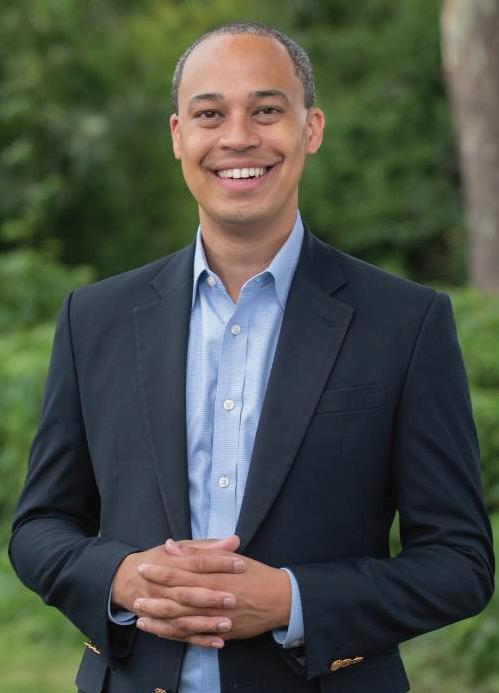
According to unofficial results from the Virginia Department of Elections, Jones won 51% of the vote to Taylor’s 49%.
Jones, a former state delegate from Norfolk and previous candidate for attorney general in 2021, returns to statewide politics with a renewed focus on consumer protection, corporate accountability and civil rights.
“The attorney general should work for the people, not the wealthiest corporations in our state,” Jones said in a recent interview. “I
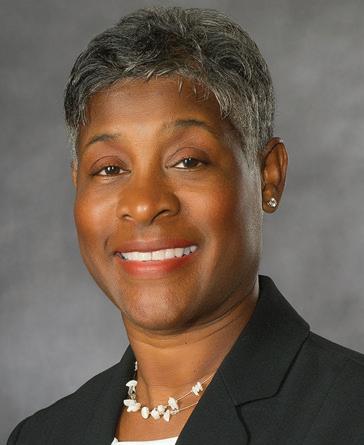
By Michael Phillips
For the second time, Richmond Commonwealth’s Attorney Colette McEachin has held off challenger Tom Barbour Jr. to retain the Democratic nomination. Similar to 2021 it was a lopsided margin, with McEachin taking 72% of the vote to 28% for Barbour. McEachin, who reached office in a special election in 2020, will almost assuredly win reelection for the second time in November’s general election.
McEachin is the widow of the late state senator and congressman Donald McEachin, who died in 2022 after a battle with cancer.
A spokesperson for McEachin’s campaign said she would release a statement on her victory in the coming days.
“I’ve called to congratulate Ms. McEachin on a race well run,” Barbour wrote. “This is how we move our party forward as Democrats: by demanding action on issues that matter and building new bases of support. We are exceptionally proud of our team for doing this necessary work this cycle. Onward!” This story originally appeared on TheRichmonder.org
will always fight to hold special interests accountable, encourage cleaner and more affordable energy practices and protect families from unfair utility costs.”
With a razor-thin victory margin, the win marks a political comeback for Jones, who stepped away from elected office in 2021 following the birth of his first child. During his tenure in the House of Delegates, he helped pass legislation to expand Medicaid, raise teacher pay, defend abortion rights and authored the “Ashanti Alert” law for missing adults — now used nationwide.
He also drew on his experience as an assistant attorney general in Washington, D.C., where he cracked down on slumlords, gun manufacturers and price-gouging corporations.
“As attorney general, I’ll continue this fight and take on the corporate price gougers driving up costs for working families,” Jones said, citing the proposed Kroger-Albertsons merger as one example. Jones, a descendant of enslaved Virginians and son of the late Judge Jerrauld C. Jones, grew up steeped in public service. His grandfather was a pioneering civil rights attorney and the first Black member of the Virginia Board of Education.
Virginia’s Democratic ticket will come into sharper focus once the election results are certified. But with Jones now locked in to challenge Miyares, voters can expect a high-profile battle this fall over criminal justice, consumer rights and the future of abortion access. The story originally appeared on VirgniaMercury.com.
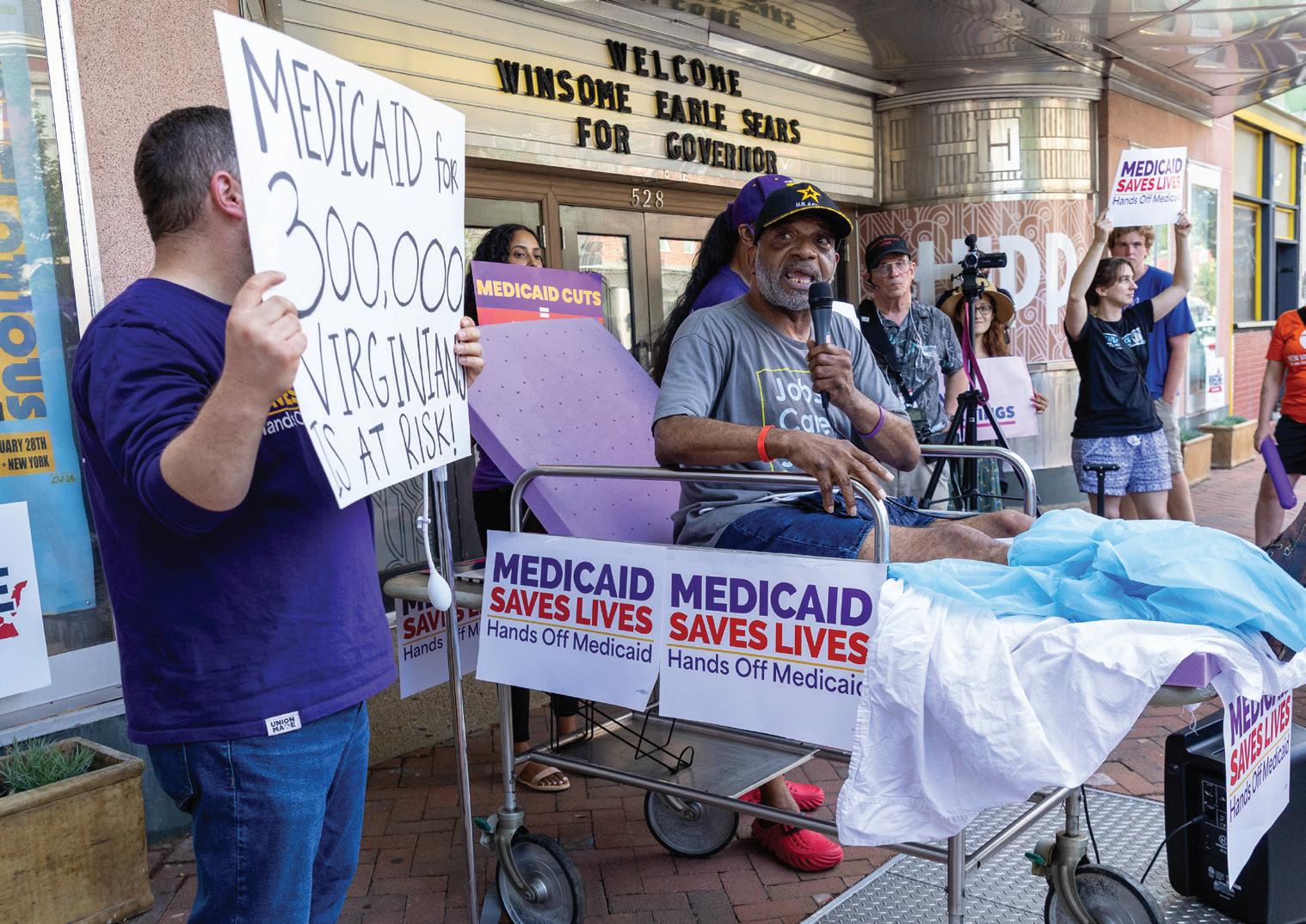
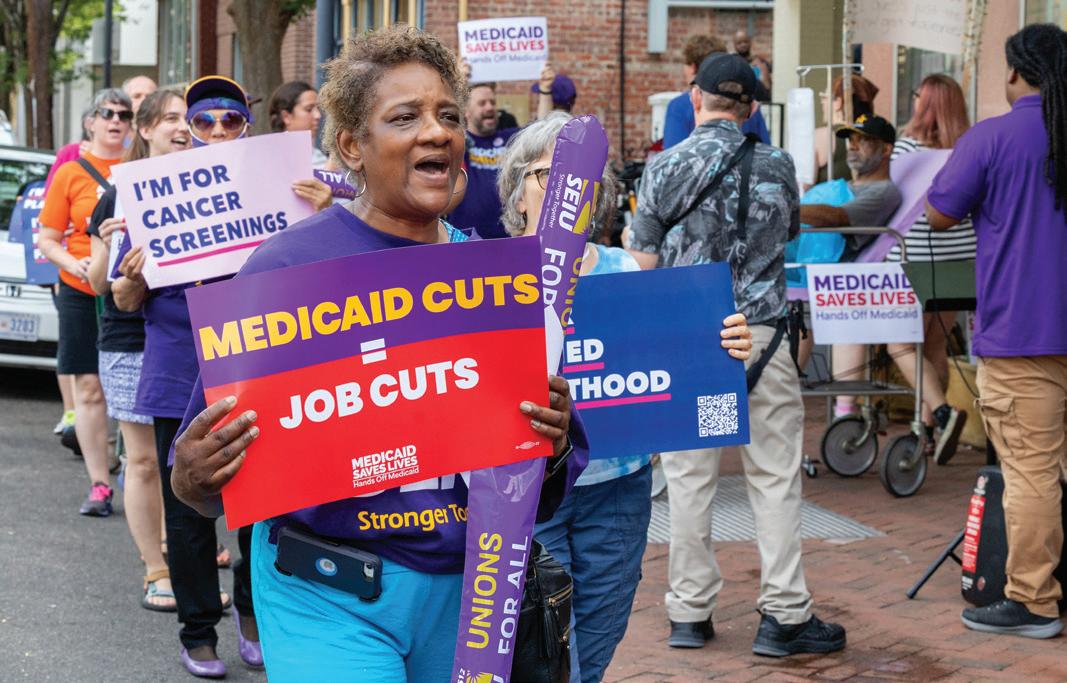
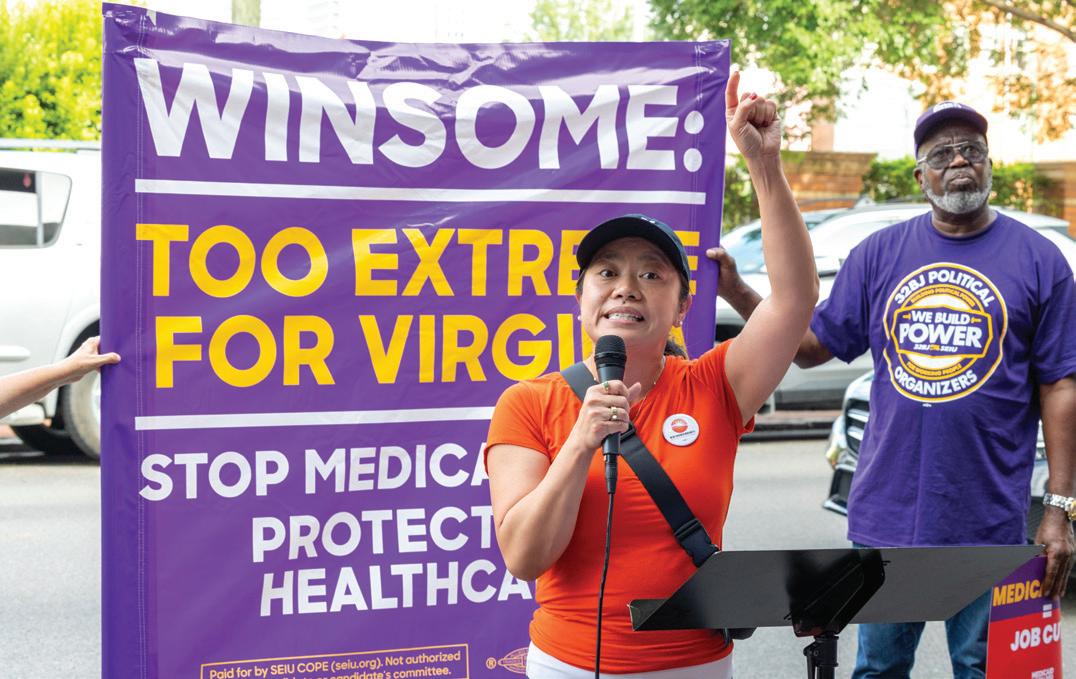

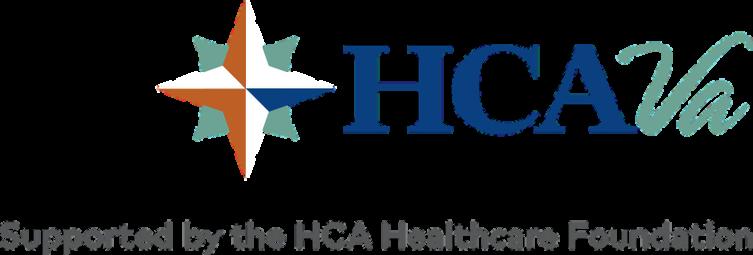



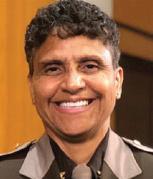
Antionette Irving
By Victoria A. Ifatsuin
Antionette Irving is one step closer to a third term as Richmond’s sheriff.
Irving won the Democratic primary on Tuesday night, defeating competitor William Burnett with 54% of the vote to Burnett’s 46%, nearly mirroring the final numbers from their 2021 matchup. In heavily Democratic Richmond, she is now all but
assured of winning the position during the general election in November.
“I love what I do,” Irving said in a pre-election interview. “I enjoy doing it.”
At the polls on Tuesday, Megan Donohue, an emergency and internal medicine physician living in Church Hill, said she voted for Irving.
“I think it’s really amazing that we have a female sheriff who’s done a good job,” she said. “I think elevating and
supporting the good work of people that have experiences is important – not that I had an issue with the opponent.”
Another voter, Noelle Schnelle, who lives in Manchester, also voted for Irving, expressing similar reasons.
“She’s been in it for a while,” the 24-year-old nanny said. “If a woman can keep that position … that says that she’s obviously more than qualified, more than competent as a woman, and especially a woman of color.”
This story originally appeared on The Richmonder.org
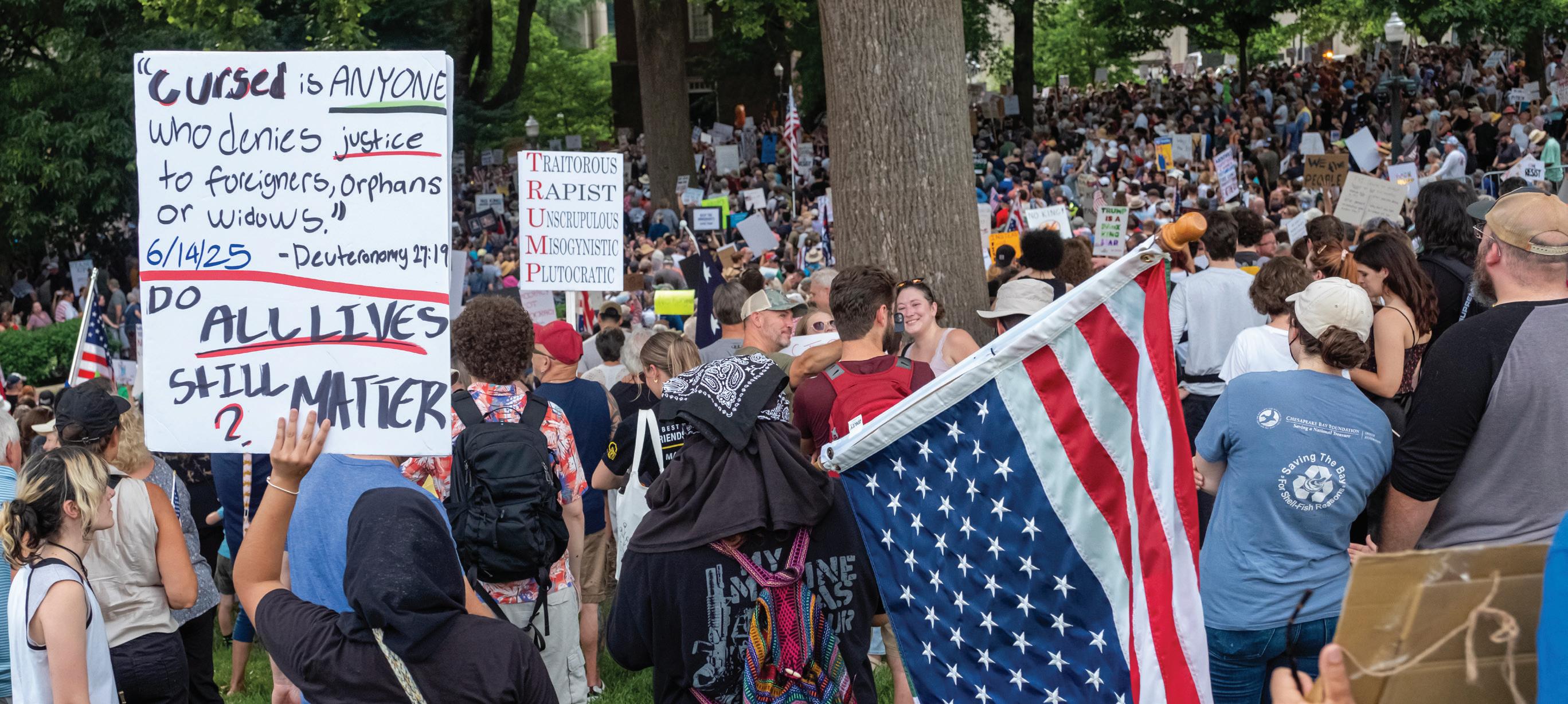
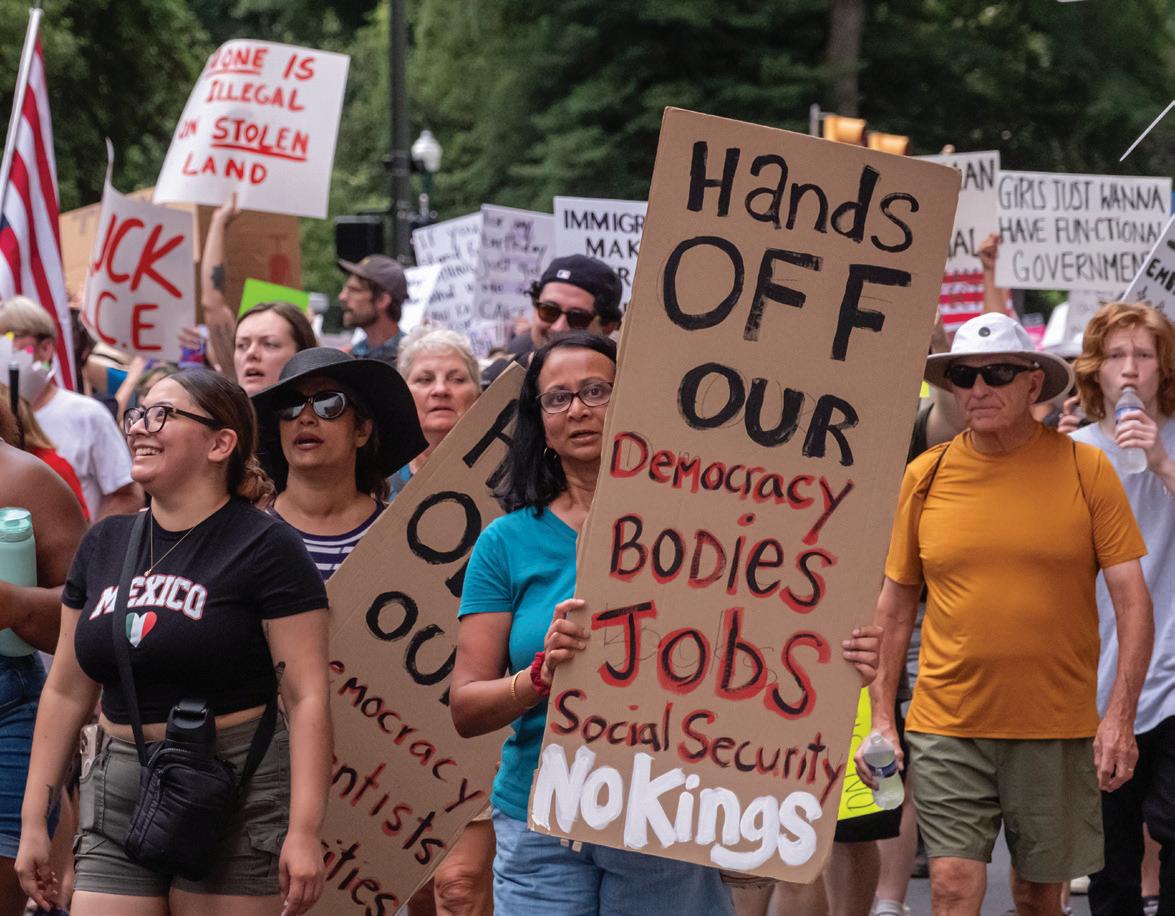

More than 10,000 demonstrators march through downtown Richmond on Saturday, June 14, during the No
the
of

Continued from A1
nationwide, according to organizers, a sharp contrast to a military parade hosted the same day in Washington D.C. as part of the U.S. Army’s anniversary celebration and the president’s birthday.
A major focus of the protest was the Trump administration’s military response to demonstrations in Los Angeles against ICE operations. Speakers and attendees also denounced the adminis-
Edge of Daybreak shines again with new music, film
Continued from A1
The band’s resurgence started picking up steam in 2015, when the Numero Group label issued a new pressing of “Eyes of Love,” with detailed liner notes and a release party held at the Steady Sounds record store on Broad Street. “That was the first time we had all been in the same room seeing each other since we were released from Powhatan,” Nubi notes.
The next year, the dreamy closing track, “Our Love,” played during a key scene in the film “Moonlight,” which won Best Picture at the 89th Academy Awards. Music journalist Jamie Pietras was among those who watched and were captivated by the song. He’d been researching hip-hop made in prison and switched gears to focus on Edge of Daybreak’s remarkable story. Pietras’ extensive research and interviews resulted in “Soul Incarcerated,” a seven-episode podcast produced by A&E.
The group’s multi-channel deal with A&E also included the opportunity to record again, and the three surviving members, Coleman, Nubi and lead guitarist Cornelius “Neal” Cade, flew out to Los Angeles, landing at the storied Sunset Sound studio. After shaking off some rust, Edge of Daybreak did just what they did in 1979: make uplifting, romantic music that aims to instill a sense of positivity.
“We hadn’t done anything together in about 40 years,” Coleman says, “but as soon as we got together, it came right together… We still knew each other, where we were going on the music, and what we felt about the music.”
Joining them in the studio was producer Steve Lindsey, who helmed recordings byAaron Neville, Celine Dion and Elton John. “We had an all-star cast,” Nubi says of the team that helped capture the four songs that make up “New Horizon.” “All these people are very professional,” Nubi says. “It’s a blessing.”
Just as acclaimed is the director of the new A&E documentary, Dawn Porter, whose previous projects examined the criminal justice system, segregation, anti-abortion legislation and more recently, the career of Luther Vandross. The surviving members of Edge of Daybreak traveled to New York for interviews.
As that story continues to unfold, the band’s name — initially a nod to the day its members would leave Powhatan Correctional Center — takes on new meaning. Each sunrise seems to bring new opportunities.
“It’s just gonna get bigger and better,” Nubi says.
tration’s deportations, detentions as well as corporate influence in politics and the targeting of marginalized communities.
Many attended out of concern for the threats they believed the administration posed to their communities, the nation and the world, as well as a desire for action and justice.
“It’s not easy at my age looking at what my grandkids and my kids gotta go through,” said Mechanicsville resident Curtis Rustin, who attended the protest with his wife Rosa. “It is unbelievable.”
Organizers also worked to carry the protest’s momentum into other community efforts. Booths for mutual aid and political groups lined Kanawha Plaza, and work is already underway on specific policies and local issues, according to RVA Indivisible organizer Mike Dunn.
“We’d like to let people know that we’re here, that we work together,” said Dunn when asked about his group’s goals as part of the protest. “That we are a force and that we are an outlet for people’s interest and their concerns.”
Continued from A1
Early results showed Hashmi winning about 58% of the Richmond vote, compared to a little less than 21% for Stoney.
Kathy Farrar, a 57-year-old phlebotomist and lab assistant who lives in North Side, said people have “had enough of Stoney.”
“You can’t tell me that they didn’t realize there was some mess going on with our water,” said Farrar, who voted for Hashmi.
John Lutz, a 38-year-old IT worker for the city who voted in the Manchester neighborhood, said he backed Hashmi because she’s “a defender of LGBTQ, BLM, bodily autonomy.” He said he respected Stoney as a mayor and liked him personally.
“But some of the things that come out
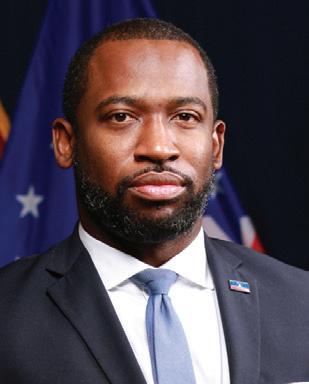
recently with the water crisis and all that other stuff has kind of made me sway away from him,” Lutz said. Hashmi’s general election opponent will be Republican John Reid, a former conservative talk radio host from the Richmond area. Reid became the Republican nominee by default earlier this year after Fairfax County Supervisor Pat Herrity dropped out due to health issues.
However, Reid’s status on the ticket has been somewhat awkward since late April after Gov. Glenn Youngkin asked him to drop out over the discovery of a racy Tumblr account that shared pornographic
images. Reid denied the account was his and accused Youngkin of rushing to judgment, rallying many hard-right activists to his side but casting a cloud over a GOP ticket that was expected to run largely on continuing Youngkin’s policy agenda.
In Hashmi’s election night speech, she sounded like she was already looking ahead to the general election.
“As your next lieutenant governor, I will be a part of that blue brick wall that we have been building steadily ever since we flipped that state Senate seat in 2019,” Hashmi said. “I’m going to be standing on the front lines to protect Virginia from extremism, and we will all be leading the charge to build something better.” The story originally appeared on The Richmonder.org
Continued from A1
operations, state officials warned that “more work is clearly needed,” given the frequency of incidents and the repeated alleged violations they’ve observed.
The notice states that the violations “represent unprecedented and very concerning situations for a waterworks this size and service area. These events erode public trust in the city’s ability to comply with applicable regulations that protect public health.”
In a statement acknowledging the notice was received, DPU officials noted their work to strengthen various plant procedures and said they “will continue to evaluate further enhancements.”
“The city remains committed to working with VDH and regional partners to
ensure it meets its mission to deliver safe and clean drinking water to the region,”
DPU officials said. The notice is the latest issued to Richmond since an outage at the plant in early January left the Metro Richmond region without running water for days. The notice also follows an agreement by the city and VDH to an Order of Consent focused on the water crisis last week.
The order includes a $6,817 fine for regulatory violations found at the plant, a summary of events before and during the crisis, and a list of corrective actions taken by DPU and other city officials so far.
“The water crisis was avoidable, preventable and should not have happened,” the consent order states. “Poor and improper operational decisions over many years caused or contributed to the water crisis,
which resulted in DPU normalizing and accepting conditions that should not have been accepted.”
Along with the fine, the city and VDH have agreed to a corrective action plan to address deficiencies at the plant.
“We’re taking the recommendations made by our independent investigators at HNTB and those from the Virginia Department of Health seriously, and we’ve already checked a large number of items off the list,” Avula said in a statement. The city retained infrastructure development firm HNTB Corp. in January to develop a report on the circumstances surrounding the city’s water service disruption.
“There’s a lot of work ahead of us, but I know that, together with our partners, we can build a more resilient water system that our region deserves.”
By Jeffrey Collins Associated Press
People of faith gathered again at Mother Emanuel AME on Tuesday just like they did 10 years ago, searching for God’s truth and his love in the church fellowship hall.
On that horrible night in 2015, nine Black church members were gunned down by a white man who hated them just for the color of their skin. He sat with them through their Bible study, then as they closed their eyes and bowed their heads, he started firing.
As survivors gathered in 2025, they invited another congregation that knows the pain of murderous hatred to join them. When a gunman killed 11 people at the Tree of Life synagogue in 2018, Mother Emanuel’s pastor, the Rev. Eric Manning, flew to Pittsburgh to comfort another flock.
A lament about a world unchanged
It was up to Rabbi Jeff Myers to lament Tuesday that the world hasn’t changed as much as was hoped by the congregation of the South’s oldest African American church, which was founded by enslaved people, torn down after they rebelled and then rebuilt following the Civil War.
“Both of us were assaulted by Americans who did not want us to exist, who thought violence would solve their problems,” Myers said.
Then he read the portion of the U.S. Declaration of Independence that starts with “we hold these truths to be self-evident, that all men are created equal.”
“Except for the Jews and the Blacks. That’s how I feel in America right now,” Myers said.
A call to action and justice
Democratic U.S. Sen. Mark Kelly said American society combines hate and guns in a stew that threatens the country’s existence.
“We know that hate is dangerous. But hate with a gun in its hand is deadly,” said Kelly, who was joined at the Mother Emanuel pulpit by his wife, former U.S. House member Gabby Giffords, who was gravely wounded in a January 2011 mass shooting in Arizona.
The Charleston church massacre did change the world in some ways.
The shooter, now on death row just like the killer at Tree of Life, posted selfie photos with a Confederate flag to hammer home his racist reasons for shooting Black parishioners. For many, this act made it impossible to keep defending the rebel banner as a symbol of southern heritage. South Carolina then took the flag down from the Statehouse grounds where it was installed as a rebuttal to federal desegregation orders.
A struggle with our racist past
But some things are the same. Mother Emanuel’s sanctuary still has the same deep red carpet. The church continues its mission
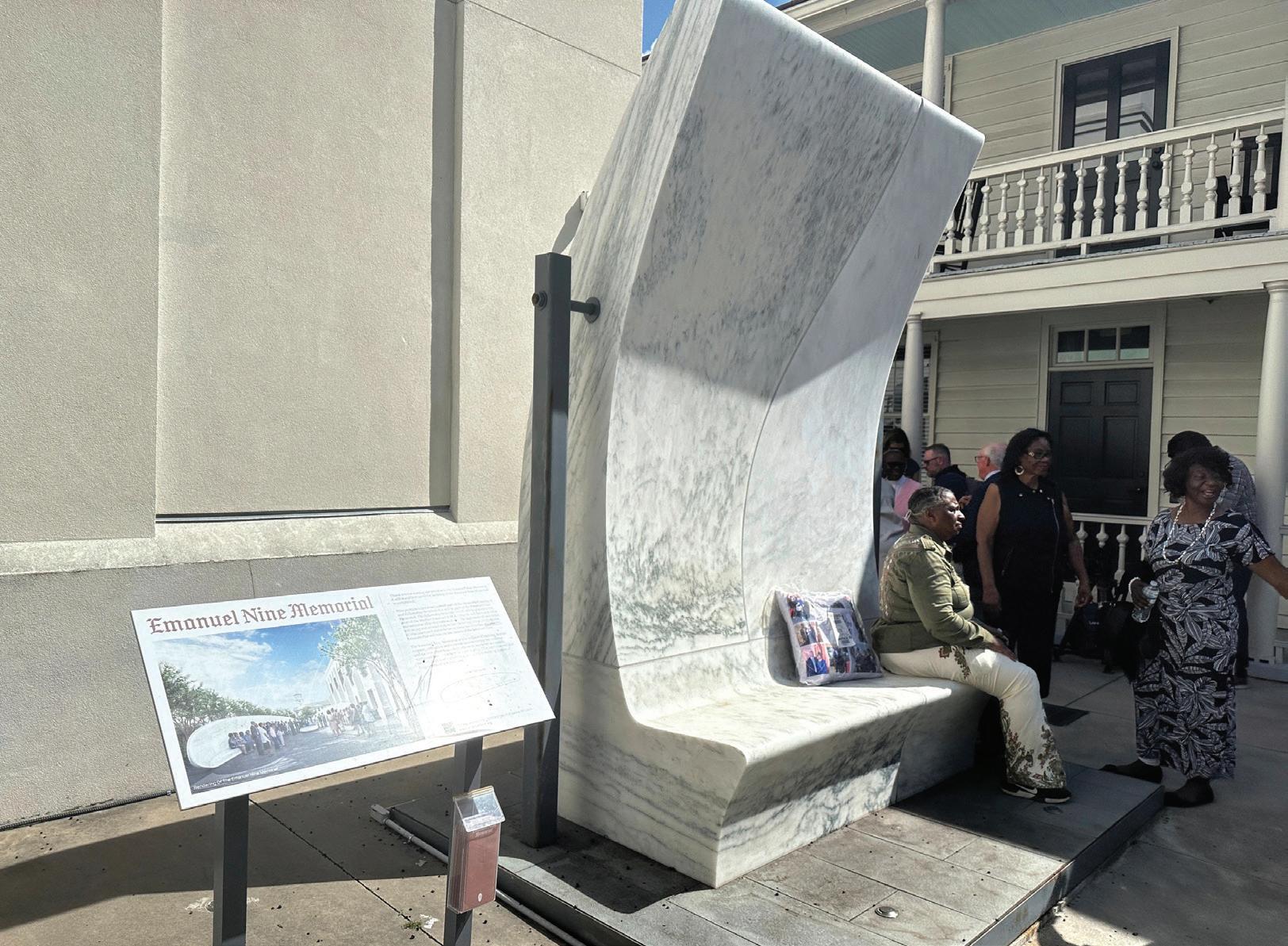
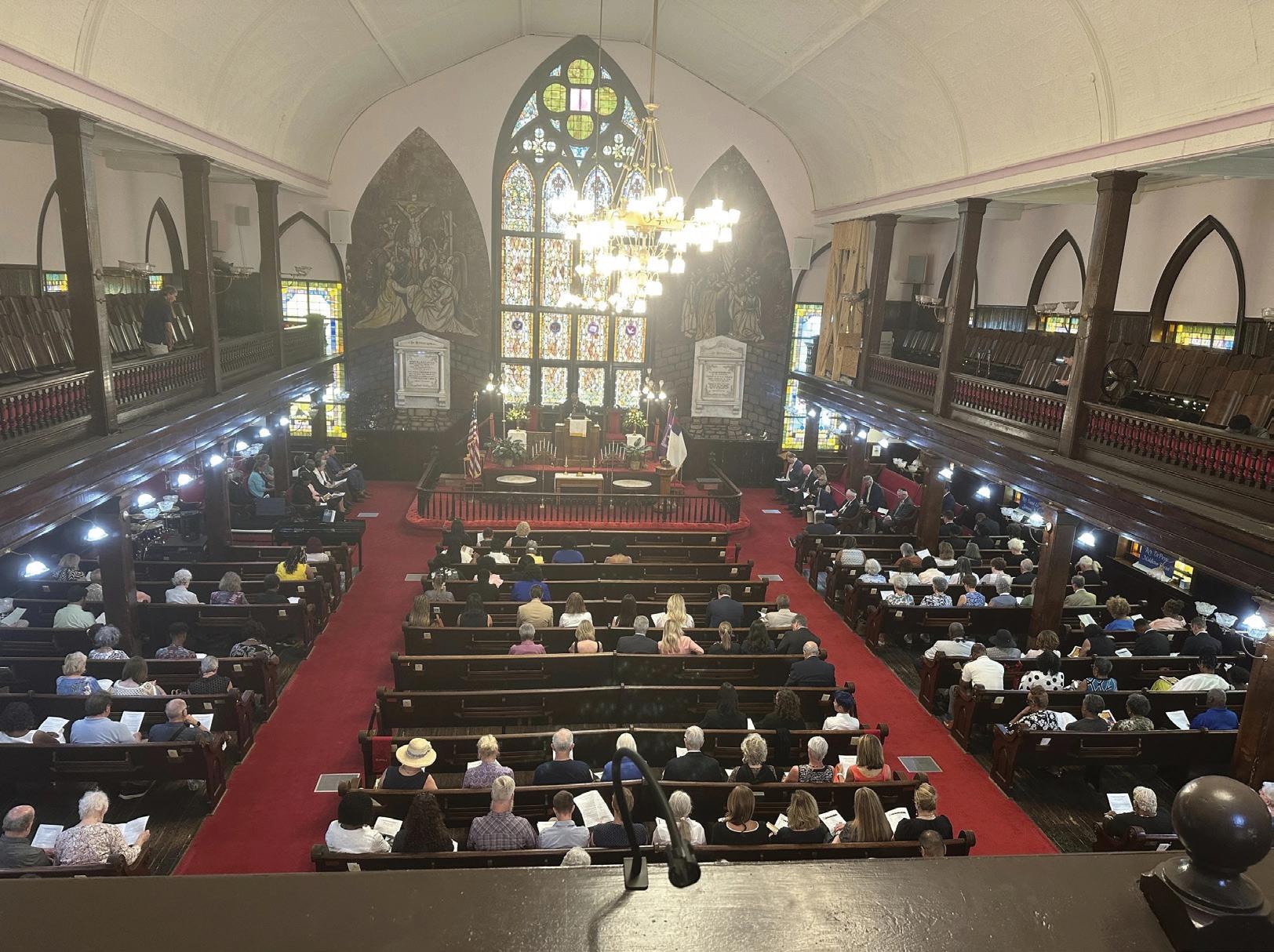
of empathy, empowerment, encouragement and equipping.
And the nation still struggles with the legacy of enslaving Black people for hundreds of years.
South Carolina remains one of only two states in the U.S. without a hate crime law even though survivors keep pushing for it. Months before the massacre at Mother Emanuel, a white North Charleston police officer shot and killed an unarmed Black man in the back about 10 miles (16 kilometers) away. Six years later, a white officer knelt on a Black man’s neck in Minnesota for nine minutes, killing him.
“On paper, the concept of the United States is a wonderful one. In reality, it is not successful right now,” Myers said. A reminder of forgiveness Mother Emanuel member Marvin Stewart has tried to emulate the love he saw in his nine friends killed that night.
“Unfortunately, the present time is very demoralizing and very challenging with the political divide. As I sat in church today, and I keep hearing the word forgiveness, I said, ‘am I in that space?’ I would use the word acceptance as the space I’m in,” Stewart said after the service.
One hymn was sung Tuesday. It was “Amazing Grace” — the spiritual that Barack Obama, the nation’s first Black president, began singing
at the memorial service for the nine victims, held just blocks from Gadsden’s Wharf, where an estimated 40% of enslaved Africans first touched U.S. soil.
Rapturous applause rained down when survivors of the shooting and relatives of the people killed were asked to stand and be seen. And moments of joy
Chris Singleton, whose mother Sharonda Coleman-Singleton was killed, asked everyone to “hug somebody who looks different than you,” and for several minutes the packed sanctuary was abuzz with smiling people, arms reaching over pews and hugs spilling into aisles.
Large photos of those killed were on display in the sanctuary — pillars of the community who included the church’s pastor who was a state senator, a high school track coach, the church sexton, a librarian and an aspiring poet. The shooter sprayed more than 70 bullets to kill them — and told Polly Sheppard he was leaving her alive so that the world would know his motive: “You’re taking over our country. And you have to go.”
He failed, the Rev. Manning said: People of faith are still here, working together for good through God.
“Let the memory of the Emanuel Nine be a light that guides us not only to remembrance, but also to renewal and change,” he said.
A new, free exhibition at the Library of Virginia will explore the historic neighborhood that was once the center of Richmond’s Black community through the lens of the Skipwith-Roper family.
JULY 14, 2025–FEBRUARY 28, 2026
EDU.LVA.VIRGINIA.GOV/HOUSE-TO-HIGHWAY

Join us at our free opening celebration and reception from 4 to 7:15 p.m. on July 17, featuring guided tours and a panel discussion that will explore the origins of The JXN Project and the exhibition, the historical importance of Jackson Ward, and more!
With all that’s going on — and there’s a lot going on — we’re pleased and heartened by the strong showing of Juneteenth events this year. It looks like more celebrations are taking place not just on the official day but also in the days leading up to and following it. Juneteenth has come a long way from a somewhat obscure day of remembrance to the national holiday it is today.
It’s a day for everyone to celebrate. Maybe that’s why it’s easier for those in power to accept — unlike other Black history events held in February or on Dr. King’s birthday, which often involve honest, sometimes uncomfortable conversations about racism and justice. Yes, Juneteenth is a party, but it’s a party with a purpose.
Let’s take a moment to reflect on how this holiday began. When U.S. troops arrived in Galveston in June 1865, they didn’t bring freedom—they enforced it, arriving two and a half years late and far from the halls where it was first promised. The newly freed Black people of Texas transformed that announcement into a lasting tradition of joy and remembrance.
Juneteenth asks us to celebrate freedom — but we should also read the fine print: America never truly abolished slavery.
The 13th Amendment, ratified just months after Juneteenth’s first celebration, outlawed slavery except as punishment for a crime. One word — “except” — left a back door wide open.
That loophole fueled a prison system that still runs on cheap and often forced labor. Even today, too many men and women behind bars work for pennies an hour — making license plates, fighting wildfires and harvesting crops.
Ava DuVernay’s powerful documentary “13th,” available on Netflix, dives deep into this legacy, exposing how the prisonindustrial complex grew out of this constitutional loophole. It reminds us to confront and dismantle the systems that continue to deny liberty to many.
Lawmakers in some states have begun to remove that loophole from state constitutions. In 2022, voters in Alabama, Oregon, Tennessee and Vermont approved amendments to their constitutions to this exception. There are efforts underway in Virginia as well. Groups such as Abolish Slavery VA, the Virginia Justice Alliance and the Abolish Slavery National Network are urging state lawmakers to close the loophole in the 13th Amendment’s exception clause.
A push is underway to do the same at the federal level. But it won’t happen on its own — especially in these times.
This Juneteenth, let’s honor our ancestors by refusing to accept half-freedom. Let’s make clear that in America, no one — not even the convicted — should ever be enslaved.
Celebration is good. So is the truth. Freedom means having both.

Black
Dyana Williams, Kenny Gamble and Ed Wright founded Black Music Month in June 1979. Also known as African American Music Appreciation Month, it was first officially celebrated by President Jimmy Carter with a White House reception. Carter created a platform to recognize and celebrate music, and many Black music executives held celebrations over the years to recognize the month. President Bill Clinton issued a presidential proclamation recognizing Black Music Month. His proclamation was “recognizing the importance of African American music to global culture and calling on the people of the United States to study, reflect on, and celebrate African American music.”In 2009, President Barack Obama renamed it African American Music Appreciation Month. The Obama proclamation, elegantly written, talked about spirituals lifting voices into the heavens during enslavement, and talked about the various genres of Black music, including blues, jazz,

soul, rock and roll, gospel and symphony. In the 2016 proclamation, one of Obama’s last, the nation’s first Black president said, “African American music helps us imagine a better world and offers hope that we will get there together.” Now in this Black Music Month 2025, we have lost a
musical icon, one whose music was a soundtrack to my teen life: Sly Stone. The frontman for the band Sly and the Family Stone made his transition this month, and all I could do was reflect on the music, the lyrics and the meaning of the unifying messages. Who could sit when the DJ was playing “Dance to the Music,” “I Want to Take You Higher” or “Thank You (Falettinme Be Mice Elf Agin)”? Who could not think about unity and acceptance when they heard “Everyday People”? Who could fail to feel affirmed when they heard “Everybody Is a Star,” with the powerful line — “I love you for who you are, not for who you feel you need to be”?
Sly Stone mixed genres — funk, soul, rock, gospel and psychedelia. He was ahead of the
curve with his multiracial band, something not often seen in the late 1960s and early ’70s. Some of his music became anthems, while others remain summertime family picnic staples — like “Family Affair,” “Hot Fun in the Summertime” or “Dance to the Music.”
What a joy and inspiration Sly Stone was. Indeed, I can’t think about Sly Stone’s music without humming or getting out of my desk chair to shake my stuff, if only for a minute.
It is unlikely that the current president will issue a proclamation to celebrate African American Music Appreciation Month. It would likely violate his anti-DEI edicts. We don’t need presidential approval, or anyone else’s for that matter, to appreciate the richness of Black music. The election of this president ought to inspire us to excavate our history, to celebrate the genius of James Weldon and his brother J. Rosamond Johnson. It ought to remind us of those early musicians who took spoons to pots to create a beat, or those gospel singers who invoked the sweet chariot coming forth to carry me home. It ought to lift subterfuge — how we used hidden meaning in songs to communicate. Our nation is under siege.
President’s peacemaking efforts invite more chaos
While the nation braced to see what would happen next in Los Angeles a surprising message appeared on President Donald Trump’s Truth Social account.
A day after videos emerged of Immigration and Customs Enforcement (ICE) agents chasing ter rified farm workers trying to hide in Cali fornia fields, the president suggested in his post that he might not fully pursue his core policy proposal of mass deportation after all.
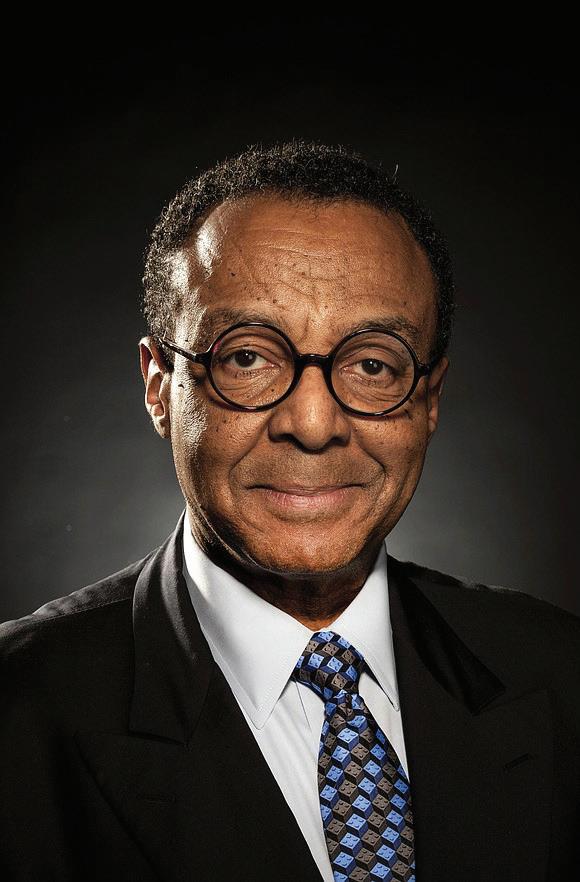
Or so it seemed.
A closer reading revealed his sympathy was directed not so much toward the workers as toward the agricultural industry and his fellow members of the managerial and ownership class — the bosses who need the labor that undocumented workers disproportionately provide.
“Our great farmers and people in the hotel and leisure business have been stating that our very aggressive policy on immigration is taking very good, longtime workers away from them, with those jobs being almost impossible to replace,” he posted.
To underscore how much of a change in tone this represents, recall the language he used in 2015 at Trump Tower in New York to announce his first campaign, spinning up fear, loathing and resentment as if he were ready to invade Mexico.
“When do we beat Mexico at the border? They’re laughing at us, at our stupidity,” he said. “And now they are beating us economically.
If you’re inclined to shrug this off with something like, “Oh, that’s just Trump being Trump,”
perhaps repeated exposure to his rhetorical excesses has caused you, like many others, to normalize his charged rhetoric.
So now the president is concerned that ICE raids are hurting American farming.
Right, as Seth Meyers, host of NBC’s “Late Night,” quipped: “I hope he finds who is responsible
for that policy.”
Indeed. It’s not like Trump is unaware that farmers form a key MAGA voting bloc. It’s not like he’s never heard of the hospitality industry. He is intimately aware of its enormous immigrant labor force that goes back decades.
It’s safe to surmise that Trump has heard from unhappy farmers, a core MAGA constituency, and from unhappy members of the CEO class, and he wants to keep them on his side.
Instead of acknowledging any negative outcomes from his own decisions, Trump did what politicians often do in a pinch: He made promises that, if necessary, can easily be forgotten or denied.
At a news conference later Thursday, Trump said: “Our farmers are being hurt badly by, you know, they have very good workers, they have worked for them for 20 years. They’re not citizens, but they’ve turned out to be, you know, great. And we’re going to have to do something about that.
Trump likely thought this would sound to some like a genuine peacemaking gesture. But by now, we all ought to recognize the transactional subtext of such statements: I might have my agents fan out through the country, breaking up families and destroying lives
and businesses — or maybe not. It depends on how much their employers mean to me.
But before his faint praise for hardworking migrants had a chance to soften the face of his deportation policy, Trump was upstaged at another event.
Federal agents manhandled U.S. Sen. Alex Padilla, a California Democrat, out of the room in Los Angeles where Secretary of Homeland Security Kristi Noem was speaking to reporters while military troops patrolled downtown streets in response to unrest linked to Noem’s department’s policies.
Padilla interrupted the event to ask her a policy question about the sweeps of allegedly undocumented workers, but before he could ask it, he was shoved to his knees and handcuffed.
As the old political expression goes, it was not a good look — and Noem did not sound congenial.
“We are not going away,” she said, referring to the National Guard and Department of Homeland Security presence in Los Angeles amid protests against Trump’s sweeping deportation mission in the city.
“We are staying here to liberate the city from the socialists and the burdensome leadership that this governor and this mayor have placed on this country and what they have tried to insert into the city.”
Was this a Homeland Security speech or a campaign speech? And what “burdensome leadership” did she have in mind?
Los Angeles and the rest of us don’t need more burdens. We need to give peace a chance. But peace is not what Trump and Noem have in mind for the blue states and blue cities of America.
The writer is a columnist for the Chicago Tribune.
The man who lives in the house that enslaved people built has deployed 4,000 National Guard members and 700 Marines to Los Angeles against the wishes of Gov. Gavin Newsom and Mayor Karen Bass. His clueless defense secretary can’t say what military operations will be affected by these deployments. We are in for a fight for our democracy, and the World Bank has said that the world economy will be in the worst shape it has been since the 1960s. And yet I write about music because we need joy. Enslaved people sang. Incarcerated people sang. Civil rights workers and protesters sang. Because, as President Obama said, “music helps us imagine a better world and offers us hope that we can get there together.” Let’s celebrate Black music and Sly Stone this month. Let us savor our music and revel in our rich history. The writer is an economist and author based in Washington, D.C.




This is the America the world has been waiting to see. As the self-proclaimed defender of democracy, it is a role embedded in our nation’s history and founding principles. The United States has a long history of supporting democratic movements and institutions globally; now it must seriously fight to save its own democracy at home.
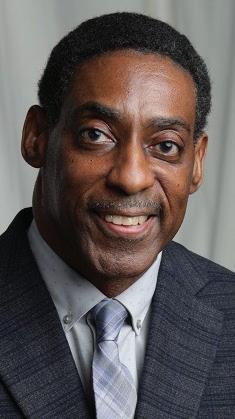
If the Senate passes the “One Big Beautiful Bill,” it becomes law. There is a dangerous provision within the bill that limits the ability of courts, including the Supreme Court, to enforce their orders. Critics argue that this provision weakens the power of the federal courts and poses a grave danger to democracy by potentially allowing the president to disregard court rulings.
This is important because it undermines the three branches of government as having a means of checks and balances. If the bill becomes law, it shows that the legislative branch is unwilling for some and unable for others to stop Trump’s growing abuse of power by his intent to handcuff the judicial branch of government. Our nation is truly at a crossroads, and the last line of defense will ultimately be the American people responding in large numbers.
On June 14, two visions of America unfolded side by side. It was a day of contrasting views: one a top-down statement of political power, the other a bottom-up grassroots surge of peaceful dissent. It was a clear display of fascism versus democracy. In Washington, President Trump presided over a grand military parade — his long-coveted display of power, coinciding with the U.S. Army’s 250th anniversary and his own 79th birthday. It was intended to be the type of triumphant celebration consistent with authoritarian regimes. Featuring
more than 6,000 soldiers, 128 tanks and dozens of aircraft, the attendance was sparse and the mood subdued. The event, which cost between $25 million and $45 million, was a total waste of taxpayers’ dollars. In stark contrast, the resistance was not merely a protest against a parade, but a profound statement of democratic values in the face of perceived autocracy. In cities and towns across the country, more than 5 million people participated in more than 2,100 events nationwide,
joined by solidarity rallies in cities abroad. They rallied under the banner of “No Kings” while rejecting what they saw as the president’s authoritarian force and the militarization of democracy. It was a proud day to be a true American when looking at the massive crowds from city to city, along with rural and suburban crowds representing all 50 states. The patriotism cannot be lost and forgotten once the backlash and retribution hit. A frustrated Trump has already vowed to intensify crackdowns on immigration in Democratic stronghold areas.
While June 14 showed us that the great experiment is not quite over, the nonviolent resistance from the protests was undercut by the assassination of Minnesota House Speaker Melissa Hortman and the wounding of Sen. John Hoffman, both Democrats, in what authorities described as a politically motivated assassination. The combination of events on that one Saturday are all connected, illustrating the deep political and moral crisis now gripping America. The person arrested in the Minnesota attack, Vance Luther Boelter, is a 57-year-old evangelical pastor known for his fervent religious and conservative views, his support for Trump and his participation in pro-Trump rallies. Boelter had a hit list of 45 elected officials, all Democrats. U.S. Sen. Tina
Smith and Minnesota Attorney General Keith Ellison were on the list.
The shadow of political violence comes from hatefilled rhetoric when those who share different political views are portrayed as the “enemy.”
Like the Jan. 6 insurrection, political violence is seeping into mainstream society with deadly consequences. The Minnesota assassination is part of a disturbing trend: Nearly a quarter of Americans now agree with the notion that “true American patriots may have to resort to violence in order to save our country.” This is up sharply from four years ago. Our nation is changing. The murder of a lawmaker is a warning sign that the country’s political divisions are no longer just verbal, they are also violent. It becomes a matter of life and death when intense emotions are stoked and it leads to political violence. The challenge, for all those who care about democracy, is to ensure that the spirit of solidarity and nonviolence that was embraced during the No Kings movement is not a one-and-done day of emotions. It needs to continue and grow.
The Black community should not look at the issue of mass deportation and the anti-ICE protests that occurred in Los Angeles and not have empathy and compassion. The fight for immigration justice is our fight because we all have the same oppressor. The solidarity between Black and Brown communities recognizes that the anti-ICE protests in Los Angeles were both a local response to immigration raids as well as an integral part of the No Kings protest. The No Kings movement represents the unity of immigration justice, anti-authoritarianism and civil rights. It represents a coordinated national effort to challenge Trump and his administration’s abuse of power. This is the America the world has been waiting to see.
The writer is the founder of the faith-based organization TRB (The Reconciled Body).
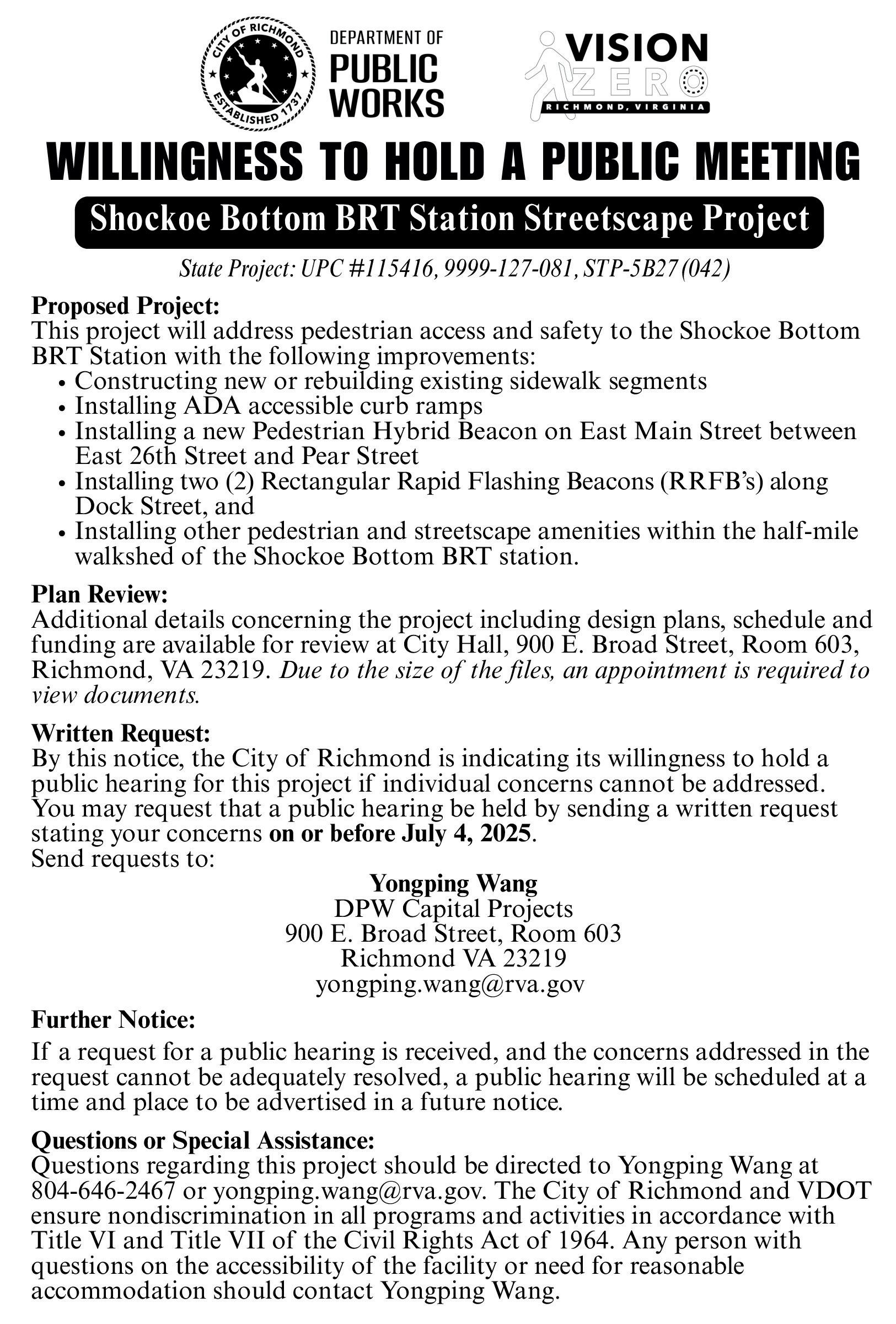
Jerrauld Jones’ speech about the Confederate flag on the floor of the Virginia House of Delegates in January 1999 displayed an oratory so gutwrenching, so authentic, that he swayed opposing delegates to his side.
Rare is the time when a state legislator — through the power of his own personal, painful narrative — changes the minds of colleagues.
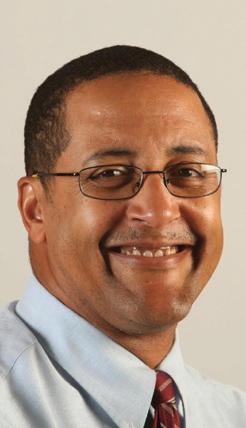
Jones, given that platform on the House floor in January 1999 as he discussed the Confederate battle flag, displayed an oratory so gutwrenching, so authentic, that he swayed opposing delegates to his side. There’s nothing I can compare it to in the General Assembly since that moment.
Jones, a 70-year-old Norfolk native and son of civil rights attorney Hilary H. Jones, died May 31.
I don’t mean to lessen his sterling lifetime of achievements — including being among the first Black students to integrate Ingleside Elementary School in 1961.
He later earned bachelor’s and law degrees. In addition to serving as a state delegate from 1988 to 2002 representing the 89th District anchored in his hometown, he later directed the state Department of Juvenile Justice. He then was appointed a juvenile and domestic relations court judge, and later a circuit court judge. He retired from the latter post last year because of health problems.
That moment in 1999, though, was an inflection point
in his career. People across the commonwealth unfamiliar with his background and determination were introduced to him in a dramatic way.
(Full disclosure: Jones’ wife, Lyn Simmons, and son, Jay Jones, and I have long attended the same Catholic church in Norfolk. Simmons is a juvenile and domestic relations district judge, and Jay Jones is a former delegate and
current Democratic candidate for state attorney general.)
I was an editorial writer at the (Newport News) Daily Press in 1999. I remember seeing television accounts of Jerrauld Jones’ speech as he explained why Virginia shouldn’t give its imprimatur by placing the Confederate flag on state license plates.
I couldn’t find footage of Jones’ impassioned comments that day; a House of Delegates official told me video archives don’t go back to 1999. News articles can’t truly capture Jones’ gripping explanation of how — for African Americans — the flag represented fear, intimidation and white supremacy.
But those news stories will have to do: The Sons of Confederate Veterans had wanted the flag symbol on a specialty license plate. Jones, a Norfolk Democrat and head of the legislative Black caucus, relayed his first memory of the flag to colleagues. When he was just six, returning with other Black children and their parents from a field trip, they saw the flag being waved in a field next to a burning cross at a Ku Klux Klan rally, The Washington
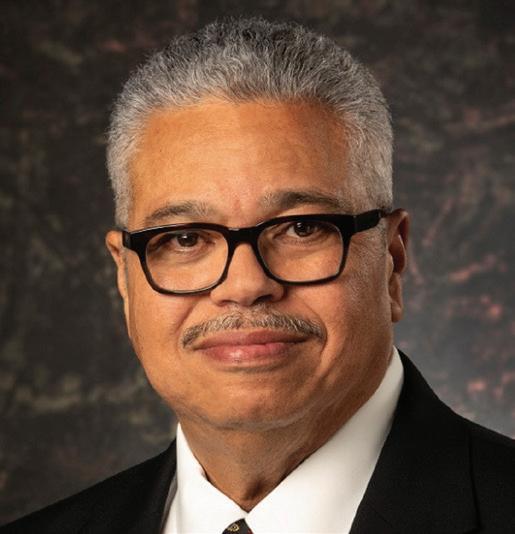
Post reported.
“The fear in that bus was so great you could smell it,” Jones said. “I saw the stark fear in my mother’s face as she looked out that window.
… All we could do was hope and pray that we would not be molested because of that symbol of hate and violence.”
A year later, he and his brother attempted to enroll at Ingleside Elementary School.
“We not only were told, ‘Ni-er stay out, ni--er go home’ — that we would dare try to integrate their schools — but we were greeted with waving Confederate flags,” he said. And later, he brought his point home: “And now, some want to put that symbol of pain on the cars of Virginia.”
The Post noted that when Jones rose to speak, many delegates were paying their usual scant attention to business. By the time Jones was halfway through his 20-minute teachable moment, though, “a respectful silence had settled over the room.”
The House approved by voice vote an amendment allowing the words “Sons of Confederate Veterans” on the plate, but not the logo. Jones later received hate mail, and the SCV went to federal court to restore the flag. No matter: Jones’ courage, persuasiveness and representation of African Americans were on full display that day a little more than a quartercentury ago. That incident was a microcosm of his lifetime of leadership and service.
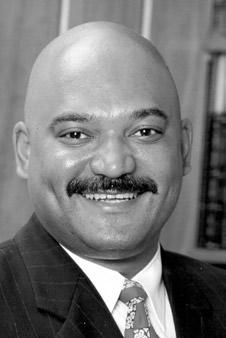


By Tim Reynolds
The Associated Press
Given the way Indiana guard Tyrese Haliburton was limping out of the postgame news conference after Game 5 of the NBA Finals, it’s safe to assume he’s a fan of the schedule right now.
Put simply, he could use a couple of days off — at least.
Haliburton has a lower leg injury — no one’s saying exactly what it is, whether it’s an ankle, calf or something else — and it seems to be the sort that, if this were a back-to-back in December, he’d likely be missing at least one game. But these are the finals, this is June, and there are no back-to-backs in the playoffs. By the time the league reaches its final series, twoday breaks between games aren’t uncommon.
“Amen to that,” the Pacers are probably saying.
“The Finals, the NBA Finals, is one of the great stages in all of sports,” Pacers coach Rick Carlisle said. “And so, it shouldn’t happen quickly and abruptly. It should happen at the right pace and the right tempo, and the space in between games does help player health. That’s a very important aspect of it.”
This year’s finals included a one-day gap between games only once, separating Games 3 and 4 in Indianapolis. Every other game has come with a two-day break, including Game 6 at Indy on Thursday night. If the Pacers win to force a Game 7 back in Oklahoma City, there will be two more days off before the deciding game Sunday night. It should be noted that the Thunder don’t mind the drawn-out schedule either.

would be unthinkable now; the NBA hasn’t even scheduled that kind of stretch in the regular season for years.
Minneapolis and New York did the same — five games in seven days — in 1953. Boston and the Los Angeles Lakers played a five-game series in eight days in 1965. Golden State and Washington played four games in eight days in 1975, with two cross-country flights. And that was long before charter flights became standard in the NBA.
“We’re fortunate in this series. Travel is pretty reasonable. Not a long distance,” Carlisle said. He’s well aware that this finals matchup has the shortest distance between the two cities — Oklahoma City and Indianapolis are 688 miles apart by air — of any finals series since 1956. “Not a long flight. I do believe it’s a better circumstance for the overall integrity of the competition.”
The two-day gaps give everyone — Haliburton, coaches, everyone — more time to prepare. Daigneault, who has kids ages 3 and 2, said it even gives him more time to be a dad between games.
“I do twice as much parenting,” he said, “not twice as much work.”
Even players who aren’t injured appreciate the extra rest.
“It’s a lot of games. It’s tiring, for sure,” Thunder star and league MVP Shai GilgeousAlexander said. “But every game is tiring. When you’re giving your all, every possession, you’re
“We recover,” Oklahoma City coach Mark Daigneault said. “The finals are great because you get extra time in between the games. I think that’s huge in terms of rest and recovery at this time of the year. I think it’s good for the product. I think it’s a good thing and by the time the ball goes up in the air, everybody is going to be ready to play and everybody is going to be excited.”
Free Press staff report
Virginia Union University recently appointed Alico Dunk as the 10th head coach in the history of its women’s basketball program. At a June 13 press conference, Dunk expressed his enthusiasm about joining VUU, saying he looks forward to continuing “the rich tradition of women’s basketball here at VUU.”
Dunk joins VUU following an eight-season tenure as head coach of the Stillman College women’s basketball team. Under his leadership, the Tigers posted a program-best 26-6 record during the 2024-25 season, won the HBCU Athletic Conference regular-season title, and secured their first victory in the NAIA National Tournament. Dunk’s 112 wins at Stillman are the most by any women’s basketball coach there in the past 40 years.
Before coaching at Stillman, Dunk spent two seasons as head coach of the men’s basketball team at Elizabeth City State University (ECSU). He also led the ECSU women’s team for five years, compiling an 83-56 record. During that time, his Lady Vikings won the CIAA Northern Division twice, and he was named the 2013 CIAA Coach of the Year after guiding ECSU to a school-record 24-4 season and a 15-1 mark in conference play.
Dunk praised the support system at VUU as a key reason for his decision.
“They have great people here. Everybody here is on the same page, everybody wants to win. Everybody supports one another,” Dunk said. “Anytime you’re going to any new job, you want to have that support system, and we clearly have that here at VUU.” Dunk began his coaching career as a men’s assistant at ECSU from 2003 to 2009, a period highlighted by the Vikings’ 2007 CIAA Tournament championship.
A native of Ayden, N.C.,, Dunk was a standout twosport athlete at Ayden-Grifton High School, earning All-State honors and a McDonald’s All-American nomination in basketball his senior year. He started his college basketball career at the University of Tennessee before transferring to East Carolina University, where he served as team captain his junior and senior years.
After coaching one season at Hertford County High School and playing professionally in Asia, Dunk earned a master’s degree in sports management from Virginia State University
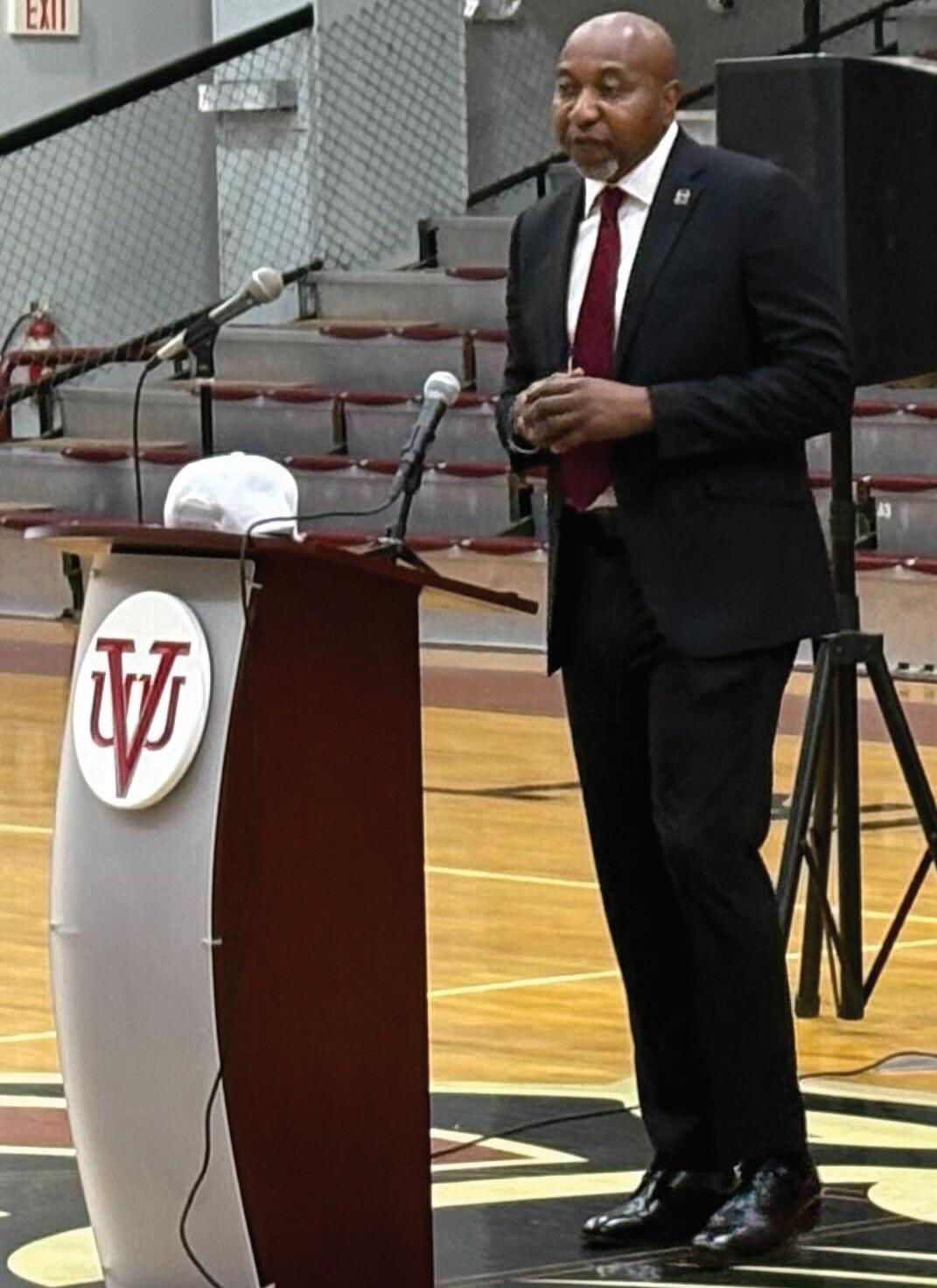
Mekhi Wilson
Alico Dunk speaks during his June 13 press conference after being named Virginia Union University’s 10th women’s basketball coach. Dunk comes to VUU after eight successful seasons at Stillman College, where he compiled 112 wins. in 2010.
Looking ahead, Dunk has ambitious goals for the program.
“I see us competing on the national level. That’s the ultimate goal. Year in, year out, we
want to be on the national stage. We want to have an opportunity to win the national championship,” he said, expecting the team to compete nationally within two to three seasons.
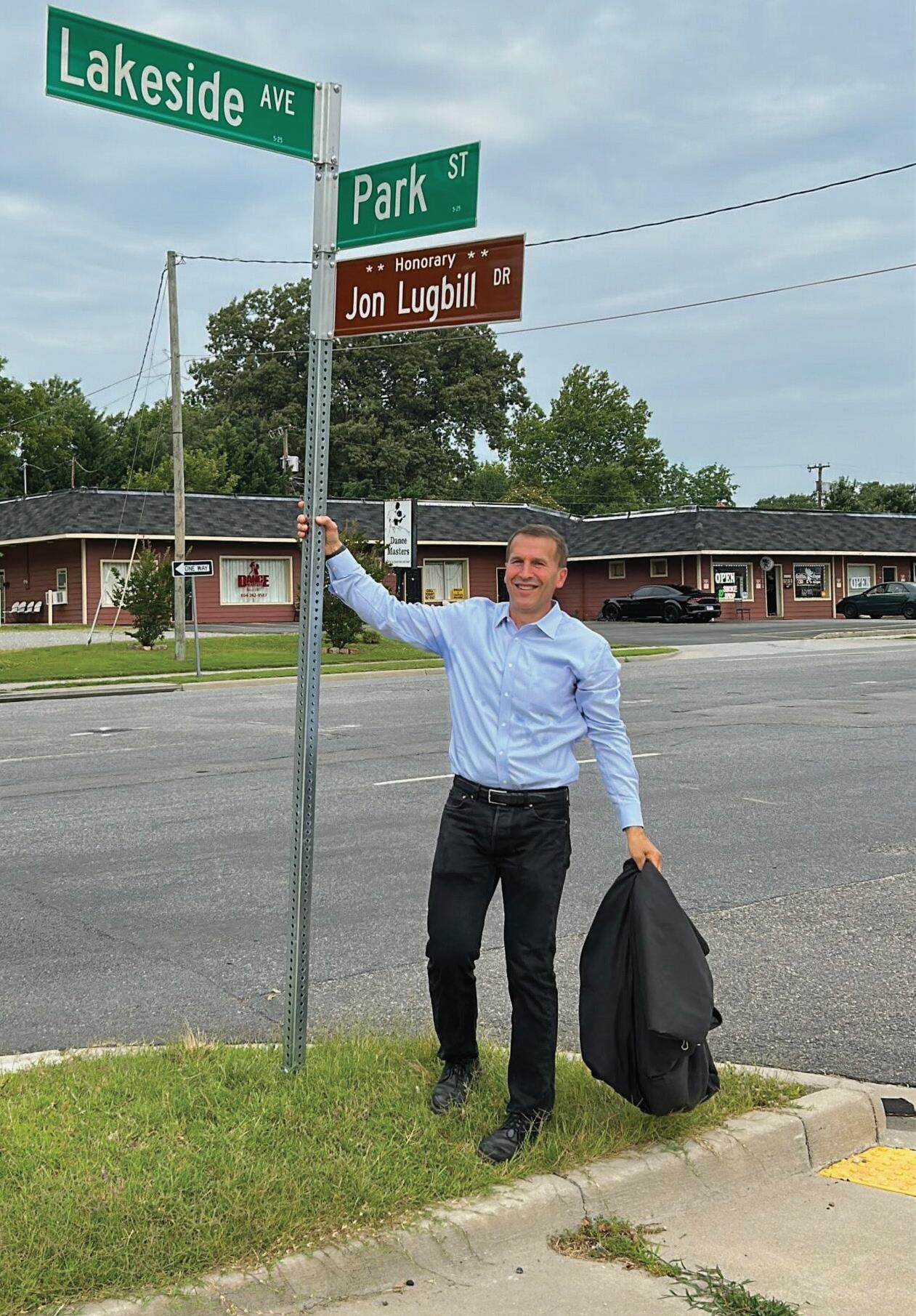
going to be tired. I don’t think I’m the only one out there that is tired.”
It wasn’t always this way.
The first NBA Finals were in 1947, before the league was even called the NBA — it was the Basketball Association of America then — and before the title round was known as the finals.
(After being called the BAA Finals in the early years, it was known as the NBA World Championship Series until the mid-1980s.)
That first year, Philadelphia and Chicago played five games in seven days. Such a pace

Carlisle said the extra time lets coaches study more film, though by this point the Thunder and Pacers know each other about as well as possible. Haliburton will get another 24 hours of whatever treatment plan the Pacers’ medical staff can devise to get his leg ready for Game 6.
“All these guys playing in this series on both sides. I think it’s pretty clear now that we’re going into the sixth game, and all the attention and the crowd noise in both arenas, everything — this is a lifetime opportunity,” Carlisle said. “Not many guys are going to sit, even if they are a little banged up.”
Free Press staff report
The Richmond Flying Squirrels and the Binghamton Rumble Ponies battled for 10 innings Sunday before thunderstorms rolled through The Diamond and forced the game to end as a 4-4 tie.
The tie is just the second in Flying Squirrels history. The team’s Aug. 12, 2018, game against the New Hampshire Fisher Cats was also called a tie after rain halted play at 1-1.
Richmond (18-44) rallied from three deficits against Binghamton (42-19).
Binghamton struck first when Jett Williams tripled to lead off the game and scored on Nick Lorusso’s two-out single off Richmond starter John Michael Bertrand.
The Flying Squirrels evened the score in the third. Justin Wishkoski was hit by a pitch and stole second. Later, Diego Velasquez stole second and Wishkoski scored on the throw.
William Lugo’s two-run homer off reliever
Tyler Myrick gave Binghamton a 3-1 lead in the sixth. Bertrand finished with two runs allowed over 5 1/3 innings, with four strikeouts and five walks. In the seventh, Richmond tied it at 3-3 when Cal Mitchell’s sacrifice bunt led to a throwing error that scored Jairo Pomares, and Adrian Sugastey followed with a sacrifice fly. Binghamton pulled ahead 4-3 in the eighth on Matt O’Neill’s RBI double, but the Flying Squirrels tied it again in the ninth. Mitchell doubled, moved to third on a wild pitch and scored on another wild pitch with two outs. Braxton Roxby kept Binghamton scoreless in the ninth and 10th, striking out four. Wishkoski started the bottom of the 10th on second, advanced on a flyout, but a double play ended the threat. Heavy rain forced officials to call the game before the start of the 11th. Richmond returns home June 24-29 to open the second half of the season against the Reading Fightin Phils.
Norfolk State adds Penn transfer Iyanna Rogers to women’s basketball roster
Free Press staff report
Norfolk State women’s basketball head coach Jermaine Woods announced Thursday the addition of Penn transfer and former McDonald’s All-American nominee Iyanna Rogers.
Rogers, a 6-foot-2 forward, appeared in 15 games for the Quakers during the 2023-24 season before an injury sidelined her for the 2024-25 campaign. She shot 53.8% from the field and 50% from 3-point range as a junior, posting a season-high 12 points, seven rebounds and
two blocks on 6-of-8 shooting against Gwynedd Mercy.
As a freshman, Rogers played in 11 games, tallying 16 points, 14 rebounds, three assists and three steals. She scored a freshman-season best 10 points and grabbed five rebounds against Gwynedd Mercy.
A Highland Springs High School standout, Rogers was a two-year captain and earned AllRegion honors twice. She was named Second-Team All-State and Third-Team All-Metro and finished her junior season with 342 points, 196 rebounds, 89
Retiring Sports Backers director honored with street designation
Free Press staff report
Henrico County and Sports Backers have renamed the street outside the organization’s headquarters in honor of Jon Lugbill, who has served as executive director for 32 years.
Park Street, which connects Lakeside Avenue to Sports Backers’ offices, now also carries the honorary designation “Jon Lugbill Drive.”
County officials said the recognition highlights Lugbill’s leadership and the organization’s growth during his tenure.
“Jon Lugbill has left an incredible impact on the Richmond region through his leadership of Sports Backers,” Henrico County Supervisor Roscoe D. Cooper III said in a statement. “Henrico is proud to celebrate Jon and his achievements by recognizing Park Street as Honorary Jon Lugbill Drive.”
Sports Backers’ new executive director, Will Dixon, said the sign will serve as a reminder of Lugbill’s contributions.
Jon Lugbill stands next to the new street sign for Honorary Jon Lugbill Drive outside the Sports Backers headquarters in Henrico County. Lugbill is retiring this month after 32 years as executive director.
“Naming the street outside our headquarters in his honor is a powerful gesture that ensures Jon’s drive has a permanent place at the heart of our organization,” Dixon said.
Sports Backers, founded in 1991, has become known for events such as the Ukrop’s Monument Avenue 10K and the Allianz Partners Richmond Marathon, along with advocacy and fitness programming across the region. Lugbill, a former world champion canoeist, is set to retire at the end of June.
blocks, 61 steals and 12 assists. ESPN rated her a three-star prospect and ranked her among the top 60 players in the country. Norfolk State is coming off a historic season that included its third consecutive MEAC Tournament championship and the program’s highest NCAA Tournament seeding at No. 13. The Spartans have made four NCAA Tournament appearances in their program history.

Spotlight on the collective board member at Rags & Bones Local bicycle co-op
Rag & Bones, Richmond’s volunteer-run bicycle co-op has become a vital hub for the city’s bicycle community. Dedicated to making biking affordable and accessible, the non-profit offers low cost refurbished bicycles and parts and a welcoming space where anyone can learn to keep their wheels rolling.
Sera Erickson, collective board member and mechanic at Rags & Bones, bikes daily from her home in Church Hill to her job as VCU’s sustainable transportation manager. She volunteers at the bike co-op each week, overseeing the coop’s administration.
“I try to bike as much as possible. I bike to work and for leisure,” Erickson said. “Biking is beneficial for everyone. It’s great exercise, and it’s good for your mental health.”
Drawing on her experience running nonprofit bike shops, Erickson brings valuable knowledge about bicycle co-ops to Rag & Bones. She previously worked for RecycleA-Bicycle, a nonprofit co-op in New York City that refurbishes donated bikes.
“I moved to New York City to learn about running a larger, social justice-minded bicycle nonprofit,” she said.
As RamBikes shop manager at Virginia Commonwealth University, Erickson led the Bicycle Advisory Committee in implementing campus initiatives recommended by the League of American Bicyclists’ Bicycle Friendly University program.
Rag & Bones makes bicycles accessible in creative ways. The co-op teaches people how to repair their own bikes through one-on-one guidance, used and new parts and specialized tools. It also breaks down barriers for those who can’t afford a bike.
Adults can participate in an Earn a Bike program, while youth
nights offer kids a chance to fix bikes, volunteer for a free bike and learn basic repair skills.
During the summer, Rag & Bones helps run a youth camp called Camp Spokes and offers sliding-scale workshops for bike repair. The co-op also brings its mobile repair setup to community events. To foster community year-round, the shop features a front café area with rotating art shows, a small zine library and coffee.
“Everyone needs to know how to do practical things,” Erickson said. “The more you can pick up knowledge, the better you can respond to what’s going on around you.”
By emphasizing practical knowledge, Erickson helps people build confidence and tackle everyday problems with greater self-reliance.
Where do you live?
Church Hill.
Where did you go to school?
Bachelor’s degree in sociology and master’s degree in urban planning from VCU.
What is Rag & Bones?
We’re a nonprofit, cooperatively run organization focused on making cycling accessible and affordable to the community. We provide access to used bike parts and bicycles, offering affordable refurbished bikes and repairs. We also provide a space for volunteers to help people learn how to maintain and repair their bikes, with workbenches, tools and recycled parts available during open shop hours.
What’s Rag & Bones’ mission?
As a member-driven and volunteer-run nonprofit educational space, we aim to provide nearuniversal access to bicycle repair and technical knowledge, affordable bicycles and parts, and a space where individuals
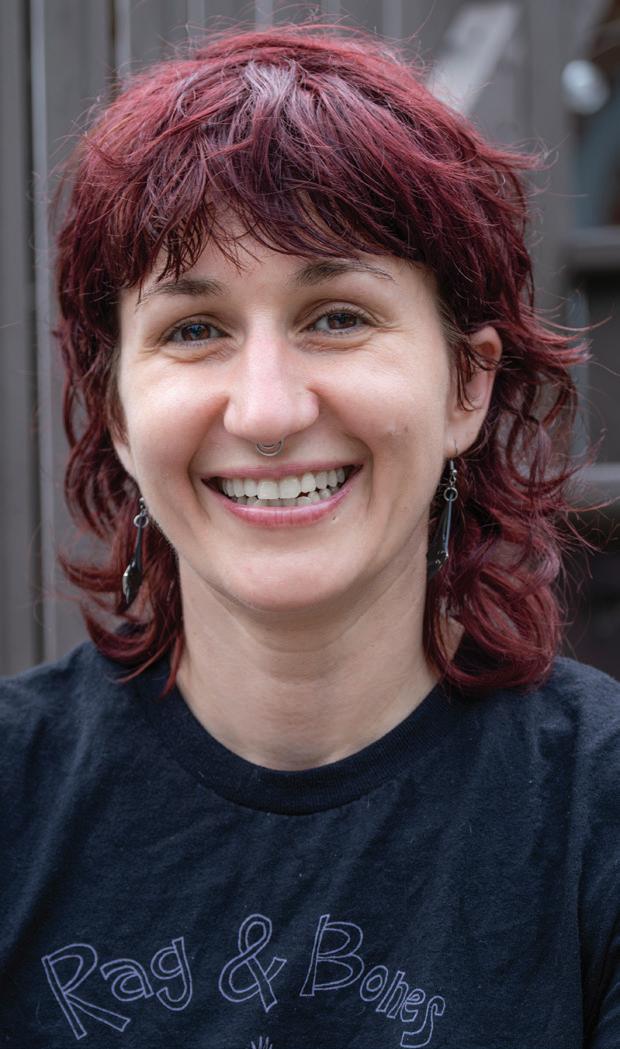
can feel safe and welcome while learning and repairing.
How was it founded?
I met Joe Bock, who offered free mobile bike repair during the Occupy movement in the Fall of 2011. When I heard about what he was trying to do, my friends and I helped him expand it into a collectively run organization and move into a warehouse on School Street.
What’s the meaning behind the name?
Rag & Bones is named after the rag and bone men of the 19th century, who were the people who would scavenge unwanted goods to repurpose or sell them to become something new.
How did you get involved?
I asked our founder, Joe Bock, to teach me everything he knew. He taught me how to disassemble and reassemble my entire bicycle and I began volunteering and helping with administrative tasks.
How have you seen Rags & Bones make a difference in the bicycle community?
Rag & Bones has made a significant difference in Richmond’s bicycle community. We provide a space for people to learn and develop skills, and as a result, many volunteers end up learning about bicycles while bringing their skills to the space. I became a bicycle mechanic after volunteering, and I know many volunteers who have followed a similar path. It also provides a valuable resource for anyone who needs a safety net or is simply curious to learn.
Why is Rag & Bones special?
It offers a place for people who can’t afford to go to a bike shop to learn how to repair their bikes. It’s a resource that empowers people by teaching them a new skill and passing on the knowledge of bike repair. This empowerment leads to a sense of community.
There’s something special about the people who embody that space. I’ve met so many best friends there; I love the energy of people learning from and teaching each other. It’s my favorite place.
Who are your partners?
We partner with so many organizations. Our youth summer camp is in partnership with Groundwork RVA. We’ve fixed bikes for halfway houses and done workshops and clinics for staff and residents of local shelters. On the other hand, we’ve worked with youth-focused organizations to get more kids on bikes. We host Cranksgiving every year, an event that fills all the community fridges by turning it into a bicycle race to gather food.
How is the bicycle co-op funded?
Our funding comes from bicycle
sales in the shop and through the services we offer, which are available for a suggested donation. The shop provides the majority of the funding needed to pay rent and manage expenses. Some small grants, such as those from the Virginia Capital Trail Foundation and New Belgium Brewing, help fund specific programs, including our youth night and overnight adventure weekend.
What is your vision for improving Richmond’s bicycle infrastructure?
My vision for a safe biking community for all our citizens is that no one is more than three blocks away from a complete street, or a street with infrastructure for all transit modes — bus lines, bike lanes, sidewalks or crosswalks.
What would make downtown Richmond a better biking city?
There needs to be investment and buy-in from people who recognize bikes as an important piece of transit in a developing city, even if they don’t bike themselves.
How can our readers get involved?
Become a member! Visit the space with your bicycle, donate parts and bikes, attend a drop-in volunteer night to help us work on bikes for the space, come see the art in our front space, or submit your art for an art show.
Do you have any upcoming events?
We have an art show in June featuring queer artists. The next place we’ll be out and about is at the Robinson Theater block party in Church Hill. Everyone who volunteers enjoys sharing their skills and knowledge, as well as participating in community events. We’ll also be helping with Repair Cafe RVA in June, and we’re already planning a big back-to-school
youth event for the fall.
What’s the make and model of your bicycle?
Surly Long Haul Trucker 26”, which is great for touring and long rides, and also makes potholes and cobblestones enjoyable.
Where do you enjoy riding? I like to ride on the 9th Street Bridge, through the Fan and any of the overlooks and parks in our city. I also enjoy exploring other cities through recommendations from people at their local bike co-ops. I especially like riding in rural areas on rail trails.
What are some of your favorite artists or music you listen to??
La femme, Mitski and anything that’s playing on 97.3 WRIR. What is something you love to do that most people don’t know about?
I sing and play keytar in the Richmond band GIRLSPIT. We play around town and do fundraisers for organizations that we care about.
Who influenced you the most?
Karen Overton, my mentor and director at Recycle a Bicycle in NYC and Susan Lindell, the shop manager of Recycle a Bicycle at the time. What book are you reading now?
I’m re-reading “Richmond’s Unhealed History,” by Rev. Ben Campbell, which is encouraging me to think about how we talk about history in our city and think about it in planning. What’s next for the Rags & Bones team?
Our goals for this year include gaining more control over chaos, expanding community programming, completing and fine-tuning our front space, and providing a community space that as many people as possible can participate in.
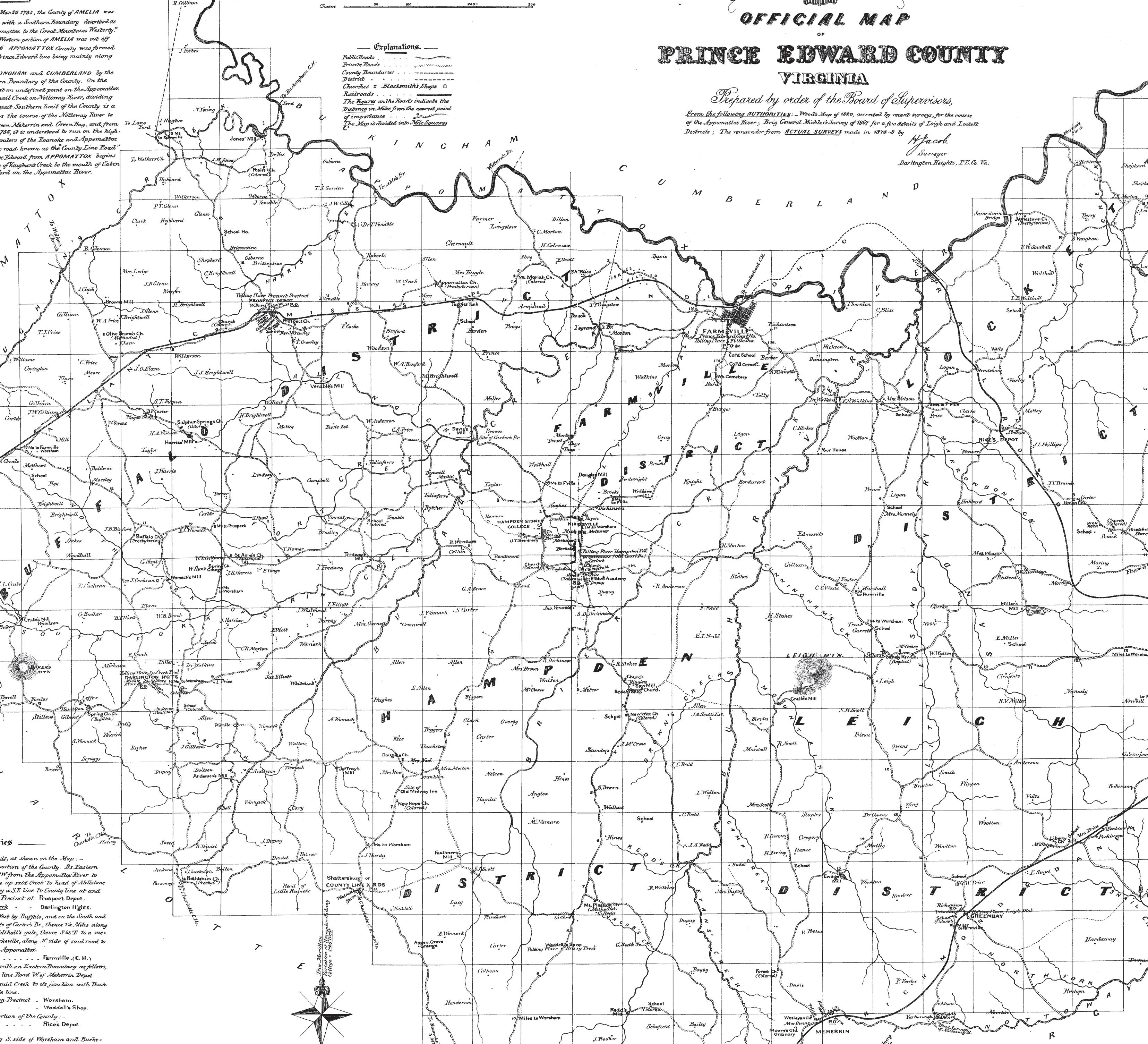
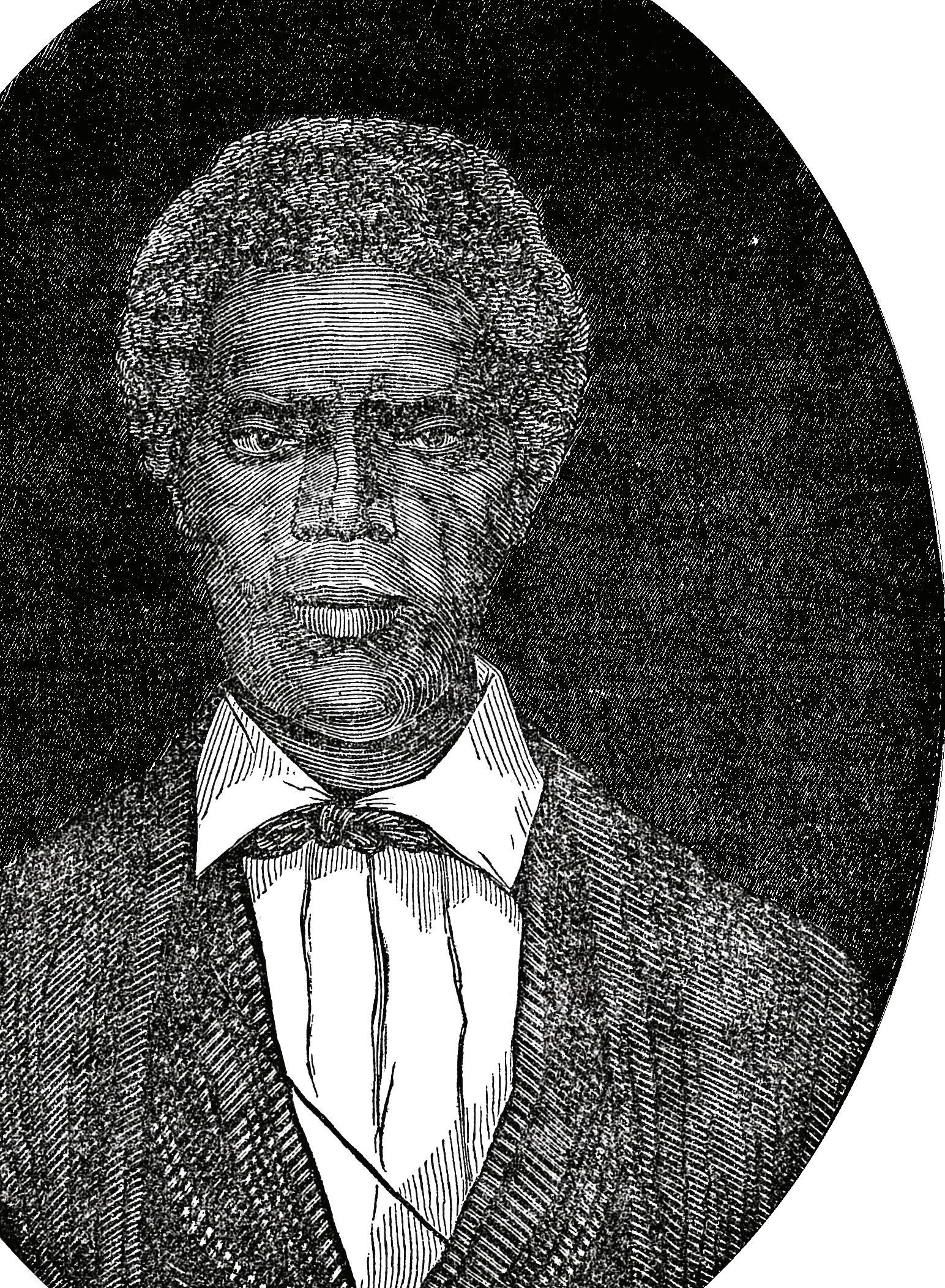
Free Press staff report
A new exhibition that highlights an important, yet little-known, chapter in the history of Richmond’s Jackson Ward neighborhood will open July 14 at the Library of Virginia.
“House to Highway: Reclaiming a Community History” is presented in partnership with The JXN Project, co-founded by Sesha Joi Moon and Enjoli Moon. The exhibition tells the story of Abraham Peyton Skipwith, the first known Black homeowner in Jackson Ward and his descendants.
The exhibition opens with a reception on July 17 at 4 p.m., which will include guided tours and a panel discussion. Panelists will include Sesha Joi Moon, co-founder and executive director of The JXN Project; Gregg D. Kimball, former director of the Library’s public services and outreach division; Barbara C. Batson, exhibition coordinator; Catherine Fitzgerald Wyatt, education and outreach manager; and Ashley Ramey Craig, community engagement and partnerships specialist.
The panel will discuss the origins of the project and the exhibition, Jackson Ward’s historical significance, the effects of the neighborhood’s destruction and plans for The JXN Project.
The exhibition will use archival records, maps and photographs from the Library’s collection to explore Skipwith’s journey from enslavement to becoming a free businessman and owner of the Skipwith–Roper Cottage, one of Richmond’s oldest documented homes.
The cottage was lost during the construction of the Richmond–Petersburg Turnpike in the 1950s, which displaced more than 1,000 families, destroyed schools and businesses and fragmented the Jackson Ward community.
The exhibition will be open Monday through Saturday, 8:30 a.m. to 5 p.m., through Feb. 28, 2026. It will then be moved to the reconstructed Skipwith–Roper Cottage, scheduled to open in April 2026 as part of the U.S. Semiquincentennial.The cottage
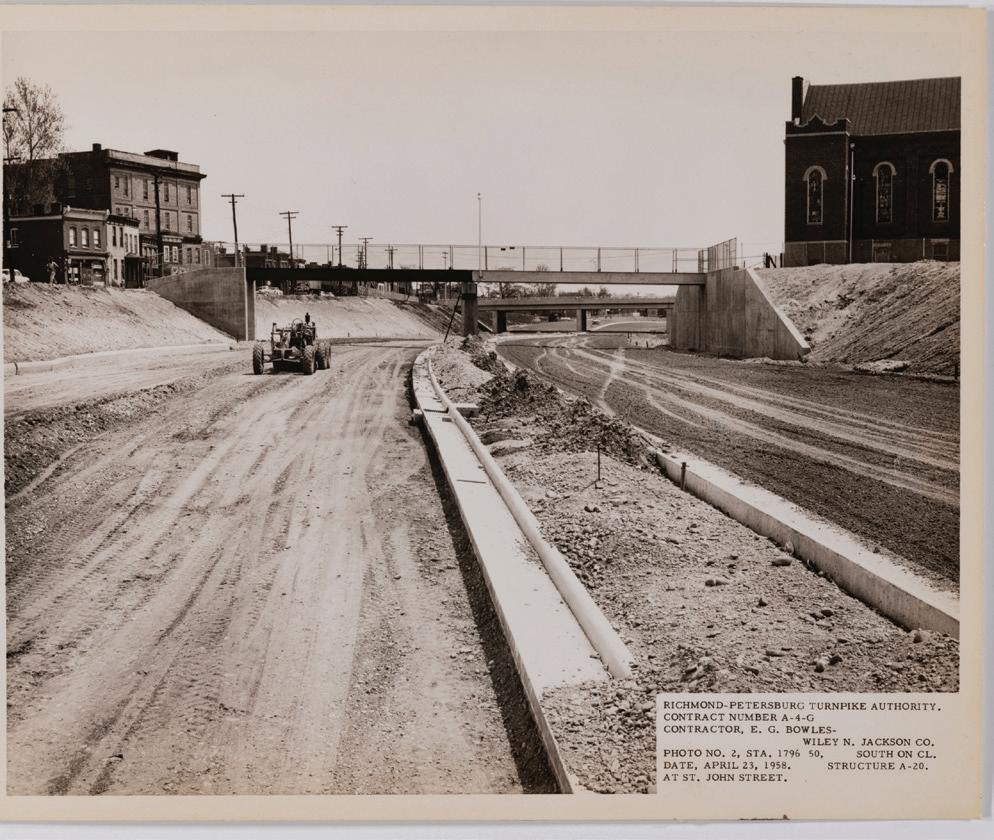
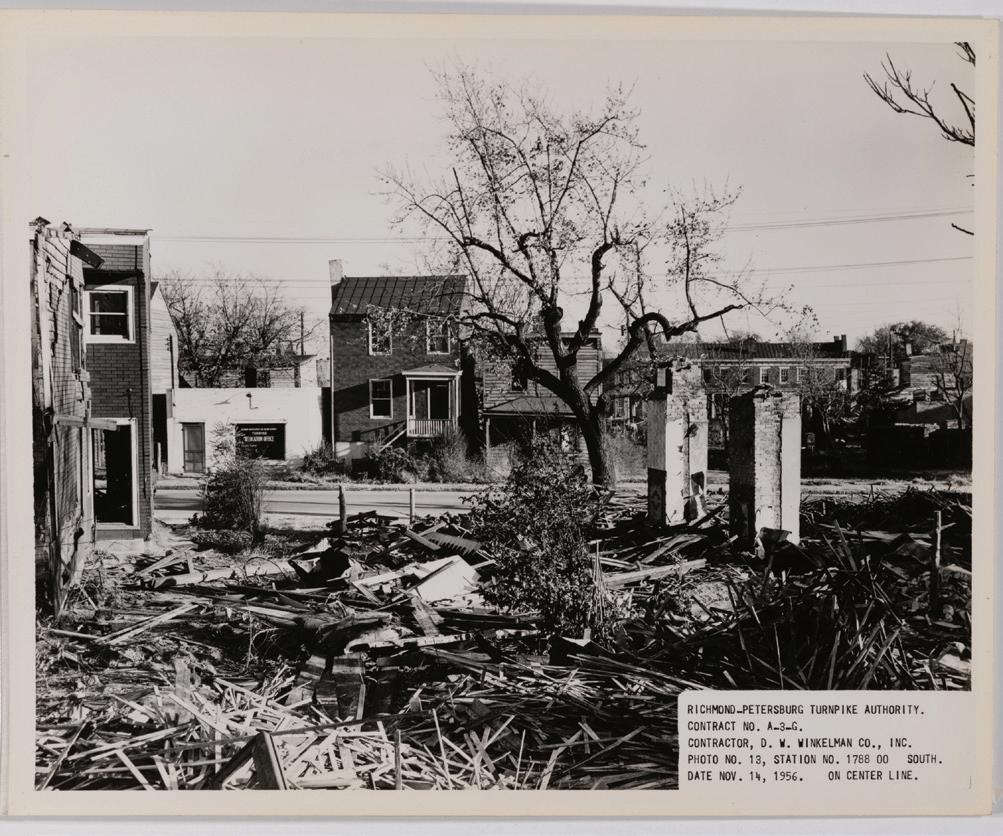
June 19
• City of Richmond Jubilation in June Celebration at Midtown Green, 2401 W. Leigh St., beginning at 5 p.m. Features music, vendors, food trucks and fireworks. Headlining performance by R&B singer Carl Thomas. Free. rva.gov
• Juneteenth Community Celebration at the Branch Museum of Architecture and Design, 2501 Monument Ave., at 6 p.m. Two new exhibitions open: (re)Framing Protest (Now) and Echoes of Us. Features a book signing, pop-up print shop and Richmond Public Library’s Memory Lab capturing personal stories. Open bar and light snacks provided. Free. branchmuseum.org
• Juneteenth Day of Freedom Celebration at St. John’s Episcopal Church and Peter Paul Development Center, 815 E. Grace St., 8:30 a.m. to 2 p.m. Music, food, and community activities celebrating freedom and African American heritage. Free. stpaulsrva.org
• 5th Annual Virginia Juneteenth Parade at Virginia Union University, at 11 a.m.The event honors the legacy of Mary Lumpkin and the history of God’s Half Acre. Free. eventbrite.com
• Fulton Juneteenth Empowerment Concert at Fulton Hill, Richmond, Va., noon to 6 p.m. Music, vendors, food and family activities. Free. visitrichmondva.com
June 20
• Henrico County Juneteenth Jamboree at Varina High School, 7053 Messer Rd., 5 p.m. to 9 p.m. Features a community parade and a football game. Free. henrico.gov
June 21
• Henrico County Juneteenth Celebration at Dorey Park, 2999 Darbytown Rd., 4 to 10 p.m. Family-friendly event includes over 160 vendors, a kids zone, Go-Go music by EU featuring Sugar Bear and the Chuck Brown Band, and fireworks at 9:45 p.m. Free. henrico.us/parks
Free Press staff report
Two artists will transform 1708 Gallery into an evolving space for projects about love this summer as part of the gallery’s new community series, “2x3: Love.”
The project invites two artists to each occupy the gallery for three and a half weeks, giving them space to develop or expand work exploring love in its many forms — from self-love to care for community and the environment.The project runs through Aug. 13.

George Ferrandi will present “The Constellate of Future Love,” a participatory project that invites the public to help shape new cultural traditions focused on caring for future generations. Ferrandi’s work will include gatherings, performances and collaborative actions, culminating in a final piece that will
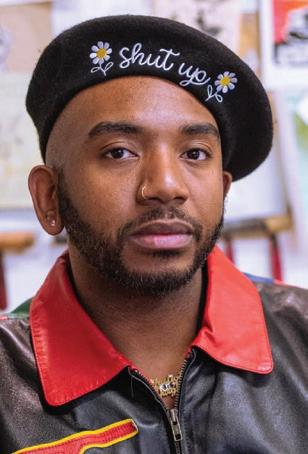
premiere at InLight 2025 this fall as part of her larger “Jump!Star” initiative. Justice Dwight’s project, “Queer Prom,” will explore healing and self-expression through quilts, portraits and community storytelling. The installation reimagines the prom experience as an act of reclaiming joy and celebrating authenticity for those who once felt they had to hide parts of themselves.
Previous editions of 1708’s community engagement series have included “10x10: Richmond Takes the Gallery,” “5x5: Summer Studio Sessions” and “3x3: Community.” Each has encouraged artists to test new ideas and connect with audiences in an, experimental environment.
More information about “2x3: Love” is available at 1708 gallery.org. The gallery is located at 319 W. Broad. St.
Virginia Prince Hall Masons celebrate 150th anniversary with event 1708 Gallery presents ‘2x3: Love’ summer community engagement series
Free Press staff report
The Most Worshipful Prince Hall Grand Lodge of Virginia Free and Accepted Masons, Inc. recently marked its 150th anniversary with a private celebration held June 7 at the Hilton Short Pump ballroom. The event honored the organization’s long-standing history and contributions to the community.
Most Worshipful Grand Master Beverly W. Morgan Jr. opened the gathering as James Brown’s “You Got to Pay the Cost to Be the Boss” set the tone for the evening. Attendees embraced a Roaring ’20s theme, featuring period costumes and décor.
Special guests included former Richmond Mayor Levar
Stoney and former Virginia Gov. L. Douglas Wilder. Wilder expressed pride in attending and reflected on the encouragement from his mother that fueled his achievements, saying, “The reason I knew I could win (as governor), because my mother always told me you could be anything you wanted to do.” The program included dance performances and themed refreshments, photo opportunities and other activities. The celebration concluded with presentations to the Grand Master. A wreath-laying ceremony took place the following day at the Masonic monument on the grounds of First Baptist Church on Harrison Street in Petersburg.
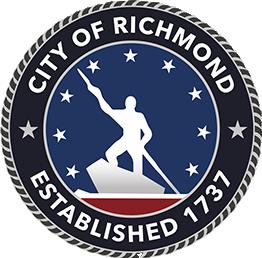
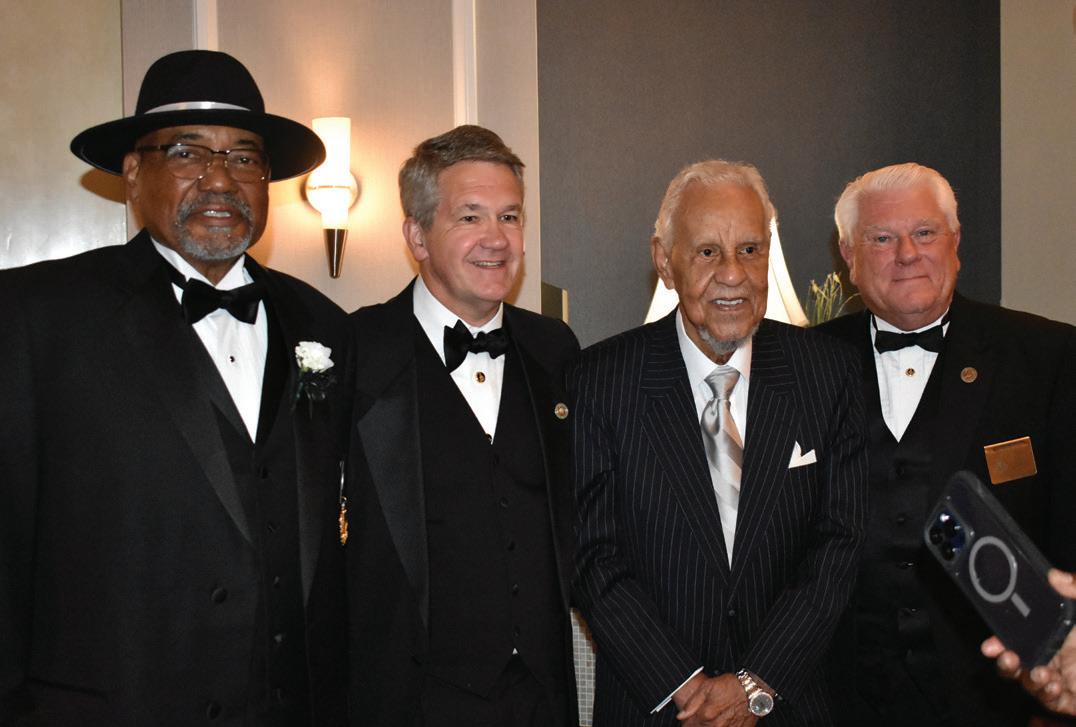
• Democratic Black Caucus of Virginia’s 20th Annual Juneteenth Commemoration, 12:30 p.m. at The Benedict on Cary. Luncheon with discussions on democracy and Black leadership. Free. vademocrats.org.
• Juneteenth Celebration at Hardywood Park Craft Brewery, 2410 Ownby Ln., noon to 10 p.m. Artist market, silent disco and music. Free. hardywood.com
• Juneteenth in the Park at Pocahontas State Park, 10301 State Park Rd., 10 a.m. to 6 p.m. Celebrates AfricanAmerican culture and resilience. Standard parking fee applies. dcr.virginia.gov
Free Press staff report
RippleCon, the Richmond Public Library’s annual mini fandom convention, is set to return for its third year on Saturday, June 28, at the Main Library downtown. The free event will run from 9 a.m. to 4 p.m. and will include special guests, workshops, gaming, vendors, photo ops and a cosplay contest.
Voice actors Nia Celeste (“Dragon Ball DAIMA,” “Solo Leveling,” “SHY”), Celeste Perez (“Dragon Ball DAIMA,” “No Longer Allowed in Another World,”“Fairy Tail: 100 Years Quest”) and Ben Stegmair (“Kaiju No. 8,” “Solo Leveling,” “The Wrong Way to Use Healing Magic”) will appear for a panel discussion and autograph signing.
Attendees can take part in workshops to design video games with Gamestar Mechanics, paint miniatures, create gaming snacks with Victoria’s Kitchen or build Pokémon terrariums.
More than 35 local vendors, including artists David Hindelang and James Saunders and authors Maxina Storibrook and Pamela K. Kinney, will offer artwork, crafts and memorabilia.
Activities include drop-in Dungeons & Dragons sessions hosted by Goblins and Growlers, casual Super Smash Bros. matches, and craft stations for pixel art, buttons and shrinky dinks. Photo opportunities will be available with members of the 501st Legion and a greenscreen photo booth. A cosplay contest will award cash prizes in beginner, intermediate and advanced categories, with on-site workshops and makeup tutorials for newcomers.
Parking around the Main Library will be free during RippleCon hours. For more information, visit rvalibrary.org/events/ripplecon



By George Copeland Jr.
Condolences have poured in from across Virginia’s education community following the death of Billy K. Cannaday Jr. last week at age 75. His decadeslong career included a variety of local and state roles, including serving as superintendent of Chesterfield County Public Schools from 2000 to 2006.
Chesterfield County Public Schools said in a statement after Cannaday’s passing, “When he began, fewer than half of our schools were fully accredited. Thanks to his dedication and leadership, every Chesterfield school had achieved full accreditation by the time he moved on to lead the Virginia Department of Education.”
Chesterfield was just one of many school systems Cannaday influenced and improved during his life. A native of Roanoke, he graduated from William Fleming High School and later earned a bachelor’s degree in health and physical education from Virginia Tech in 1972.
Cannaday returned to Virginia Tech in 1990 to earn a doctorate in educational administration, after graduating with a master’s
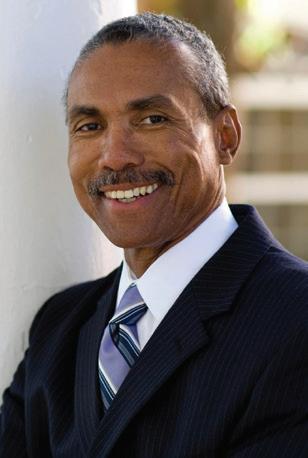
Cannaday
in educational administration from Hampton University in 1980.
After a brief stint as a sales representative for Norfolk and Western Railway Co., Cannaday became a teacher in Newport News. He went on to hold numerous roles in Newport News, Hampton and other localities, including superintendent of Hampton City Schools from 1994 to 2000. His influence remains evident in today’s school leadership.
“Dr. Billy Cannaday, Jr. was a visionary leader whose impact on public education - and on Hampton City Schools - continues to resonate,” Hampton City Schools Superintendent Raymond Haynes said in a statement. “He not only brought me into this division, but also served as a true mentor throughout my career.”
“His belief in people, his commitment to excellence, and his legacy of service have inspired generations of educators and students alike. He will be deeply missed.”
Cannaday’s work gained greater importance in 2006, when
Free
The Virginia Union University Gospel Choir has released its debut single, “Great is Yahweh,” marking a historic milestone for the student ensemble.
The new gospel anthem, produced by Hezekiah Walker and Stanley Brown and directed by Joel Lester, is available on Spotify, Apple Music, Pandora, the iTunes Store and Amazon Music.

Written by Matthew Greaves, the single features Walker and gospel singer Chris Bender alongside the choir’s vocals.
Although this is the choir’s first single,
the group has released three albums in the past: “He Had a Dream and Passed It On to Those in Earnest Meditation” (1969), “Contemporary Trends in Music” (1972) and “Sing — To Our New Day”.
The song follows the choir’s live performance during Virginia Union’s 126th commencement ceremony, where they performed for a packed audience.
“This is a momentous occasion for the VUU Gospel Choir and for the university as a whole,” Walker said. “Music, faith and education are powerful tools that can change lives, and I’m honored to be part of this journey with VUU.”
30th St., will serve lunch from 11:30 a.m. to 1 p.m. through Aug. 30.
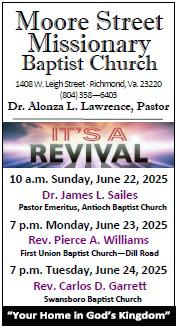
Meals are free for all children and will be served on a first-come, first-served basis. Children must remain on site while eating.
A Little Peace of Mind, 100 Arboretum Place, will serve breakfast from 8:15 to 8:45 a.m. and lunch from noon to 12:30 p.m. through Aug. 30.
Breakfast at AIM Youth Conference, 9901 Midlothian Turnpike, will be available from 10 to 10:15 a.m., with lunch from noon to 1 p.m. through June 21.
Bread of Life Temple, 2208 Summerhill Ave., will offer breakfast from 9 to 10 a.m. and lunch from noon to 1 p.m. through Aug. 30. Cathedral of Prayer, 1300 N.
Exceptional Learning Center, 4878 Finlay St., will provide breakfast from 8:30 to 9:15 a.m. and lunch from 11:30 a.m. to 12:15 p.m. through Aug. 30.
Faith of Life Daycare Center, 6110 Belmont Road, will serve breakfast from 8 to 9 a.m. and lunch from noon to 1 p.m. through Aug. 30.
Meals at Leave It to Beaver, 730 German School Road, will be available for breakfast from 7:30 to 9 a.m. and lunch from 11:30 a.m. to 1 p.m. through Aug. 30.
Restoration Temple Church of God in Christ, 1400 Spotsylvania St., will serve breakfast from 8:30 to 9:15 a.m. and lunch from 11:30 a.m. to 12:15 p.m. through Aug. 30.
Free Press staff report
Rev. Kevin L. Jones has been named the new senior pastor of Ebenezer Baptist Church in Jackson Ward, following a nationwide search that lasted more than two years.
Church leaders announced the appointment June 11, calling it a significant milestone in the historic church’s 165-year history.
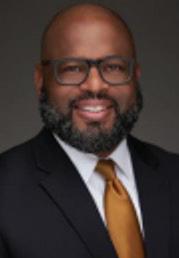
“We are both humbled and grateful to welcome Reverend Jones into the rich lineage of pastoral leaders who have guided Ebenezer with strength and vision,” said Dr. Charles R. Smith Jr., chairman of the church’s pastoral search committee. “His commitment to biblical teaching, social justice and intergenerational engagement aligns beautifully with the mission and legacy of this church.”
Rev. Jones brings extensive pastoral experience and a focus on community-centered ministry. Founded in 1858, Ebenezer Baptist Church has long served as a spiritual and cultural cornerstone in Jackson Ward. The congregation invites the community to attend services each Sunday at 11 a.m. at 216 W. Leigh St.
then-Gov. Tim Kaine appointed him state superintendent of public instruction. He also served as leader-in-residence at the University of Richmond, was a member of the Teacher Education Advisory Committee, served as dean of the School of Continuing and Professional Studies at the University of Virginia, and worked on the College of William & Mary’s Gifted Advisory Board.
Cannaday received many honors before and after his retirement in 2015, including a Blue Ribbon Award for Excellence from the U.S. Department of Education in 1984, when he was principal of Huntington Middle School. He was named Virginia Superintendent of the Year in 2005 and was among the first inductees into the CCPS Hall of Fame in 2022.
A viewing will be held Friday, June 20, from 1 p.m. to 5 p.m. at the Hamlar-Curtis Funeral Home & Crematory in Roanoke. Visitations will be held Saturday, June 21 from 10 to 11 a.m. at the First Baptist Church-Gainsboro in Roanoke, followed by a funeral service at 11 a.m.
